Front Cover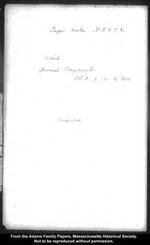
Paper Books Nos. 5, 6, 7, 8
[The preceding text was added in the handwriting of Charles Francis Adams]
Inside Front Cover, upside down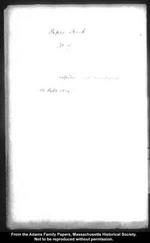
Paper book No. 7.
[The preceding text was added in the handwriting of Charles Francis Adams][No transcription available -- see page image]
Pages c2a - c2b
[Blank pages -- no images available]
Page 1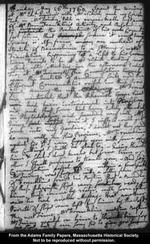
MONDAY MAY 26TH 1760.
Spent the Evening at Mr. Edd. Quincy's, with Mr. Wibird, and my Cozen Zab. Mr. Quincy told a remarkable Instance of Mr. Ben. Franklin's Activity, and Resolution, to
promote improve the Productions of his own Country, for from that
[illegible] source it must have sprang, or else from an unheard of Stretch of Benevolence to a stranger. Mr. Franklin, happening
upon a Visit to his Germantown Friends, to be at Mr. Wibirts Meeting, was asked, after Meeting in the afternoon, to drink Tea, at Mr. Quincys. The Conversation turned upon the Qualities of American soils, and the Different Commodities raised in these Provinces. Among the rest,
[illegible] Mr. Franklin mentioned, that the Rhenish Grape Vines had been introduced, into Pensylvania, and that some had been lately planted in Phyladelphia, and succeeded very well. Mr. Quincy
said [illegible] said, upon it, I wish I could get some into my Garden. I doubt not they would do very well in this Province. Mr. Franklin replied, Sir if I can supply you with some of the Cuttings, I shall be glad to. Quincy thanked him and said, I dont know but some time or other I shall presume to trouble you. And so the Conversation passed off. Within a few Weeks Mr. Quincy was surprised with a Letter from some of Franklins friends in Boston, that a Bundle of these Rhenish slips were ready for
[illegible] him. These came by Water. Well, soon afterwards he had another Message that another
Parcell of slips were left for him by the Post. The next Time Mr. Franklin was in Boston Mr. Quincy waited on him to thank him for his slips, but I am sorry Sir to give you so much
Page 2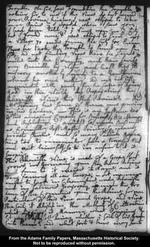
Trouble. Oh Sir, says Franklin the Trouble is nothing Sir, to me, if the Vines do but succeed in your Province. However I was obliged to take more Pains than I expected when I saw you. I had been told, that the Vines were in the City but I found none and was obliged to send up to a Village 70 miles from the City for them. Thus he took the Trouble to hunt over the City, and not finding Vines there, he sends 70 miles into the Country, and then sends one Bundle by Water, and least they should miscarry another by Land, to a Gentleman whom he owed nothing, and was but little acquainted with, purely for the sake of Doing Good in the World by Propagating the Rhenish Wines
thro these Provinces. And Mr. Quincy has some of them now growing in his Garden. This is an Instance too of his amazing Capacity for Business. His Memory and Resolution. Amidst so much Business as Counsellor, Post Master, Printer, so many private studies, and so many
Publick Avocations too, to remember such a transient Hint and exert himself, so in answer to it, is surprising.
This Rhenish Wine is made of a Grape that grows in Germany upon the River Rhine and from which it receives its Name, and is very famous, all over Europe. Let me remember to look in Chambers, under Rhenish and in Salmons Geography, under the Produce of the Countries upon the Rhine, for more Particulars of this Vine and Grape, and Wine. The soil it delights in, the Method of Cultivation, what digging, what Manure, what Pruning &c. Let me ask Mr. Quincy, whether the soil of his Garden suits them? and what sorts and how many
[sorts?]
Page 3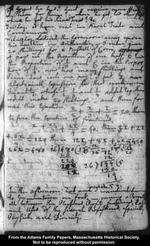
of Grapes he has? Dont they require more Heat than we have for them? Where he got his other slips. Where he got his Lime Trees? &c.
TUESDAY [27 MAY].
At home. Read, in Naval Trade and Commerce.
WEDNESDAY [28 MAY].
Loitered the forenoon away upon this Question in Arithmetic. 3 men give 20 shillings for a Bushell of Corn. [illegible] A pays in the Proportion of one half, B in the Proportion of 1/8 and C in the Proportion of 1/4. Now how many shillings and Pence does each one pay? I put X, an Algebraicall Expression, for that unknown Quantity, whose 1/2 1/3 and 1/4 added together would make 20 shillings.
And then formed this Equation. X/2 + X/3 + X/4 = 20. Then to free the Equation of fractions.
x + 2x/3 + 2x/4 = 40. Then 3x+ 2X+ 6X/4 = 120.
Then 12x + 8x + 6x = 480
[The following mathematical equation has not been fully transcribed. See page image for the full equation:]
| 26x = 480 |
26 [divided into] 480 [see page image ]
|
18 12/26 s = 18s |
5 14/26 d. |
|
|
26 [divided into] 144 [see page image]
|
In the afternoon, Zab and I wandered down to Germantown on foot-running a Parrallell between the Pleasures, Profits, freedoms, Ease and Uses of the several Professions, especially Physick and Divinity.
Page 4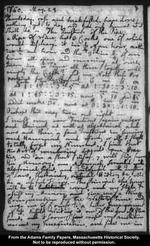
1760. MAY 29. THURDSDAY.
Rose and breakfasted. Have done nothing yet to day, and God only knows what I shall do. The Question of the Pipe. A Pipe of Wine has 3 Cocks, one of which would discharge it in 1/4 of an hour, another in 1/2 an hour and the 3rd in 3/4 of an hour all open and running at once. Quere in what Time, all three together will empty the Cask? Let me Note these Proportions for the Present.
|
cock |
m |
cock |
m |
|
cock |
m |
cock |
m |
| as |
1: |
15:: |
3 |
5 |
as |
1 : |
30 :: |
3 : |
10 |
| as |
1 |
45 :: |
3 : |
15. |
Now |
m |
m |
|
m |
|
|
|
|
|
|
5, |
10 |
and |
15 |
| added make |
m | Now as |
C |
m |
C |
m |
|
30 |
|
3 : |
30 :: |
1 : |
10 |
Perhaps this may turn out right.
I must run over Fractions again, vulgar and Decimal, as well as algebraical, and now and then, a few Questions in Fenning and Hammond, and Ward, or else I shall totally forget my Numbers. I find that the Art of numbering depends upon Practice, and in a short disuse, they will slip from the Memory. A Journal, scrawled with Algebraical signs, and interspersed with Questions of Law, Husbandry, natural History &c., will be a useful Thing. The Principal Uses however will be to
[illegible] correct
and my style, and assist my Memory,
and give me a true Compunction for the Waste of Time, and urge me of Course to a better Improvement of it. Besides Writing is one of the greatest Pleasures, and it sooner rouses my ambition, warms my Imagination, and fixes me in
Page 5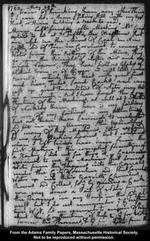
a train of thinking, than any other Thing that I can do-than sitting still with my Eyes shut, or than holding a Book to read.
Mem. Last Sunday after Meeting Mr. Cranch explained to us at Dr. Tufts's, the Machines that are used in the Mines of Coal in New Castle, and of Tin, in Cornwal, to convey up Water from the Bottom of the Mine. They go upon the Principles of elastic Air and rarefyed
Vapour. They have hollow Globes of plated Iron, or of Copper, which will hold some Barrells, which they heat with great fires and have Tubes, and Cocks, and can cast up great Quantities of Water, many Hds
[Hogsheads] in a minute. But I have forgot the Construction of the Machines, as well as the Method of Working them. Here is my failing or one of my failings. My Attention has not been keen enough, to understand and fix in my Memory the Explications of many of these Machines. Etter explained to me, his stocking Looms, but I could not when I left him, have run from the first Motion to the
compleat formation of a stocking. I did not see
thro it. Cranch once explained to me, the Machine that draws Water from the Thames, into the Canals under the City of London, and that sends Water up into their Garretts, Chambers, Rooms and Cellars, so that by Opening a Cock you may draw a Pail of Water from the Thames, in any House in the City almost, but I do not remember the Construction of it. Let me remember to
enquire of him about the Construction of these 2, that for Water from the Thames, and that for Water from the
Page 6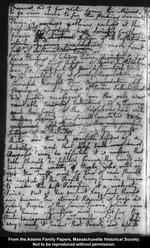
Thames, and that for Water from the Mines, and to go once more to see the stocking Loom.
There is perhaps nothing, perhaps at the present day which has deviated further from [illegible] design of Instructions which is more productive more fruitful of destructive evils, or
Few things I believe have deviated so far from the first Design of their Institution, are so fruitful of
other destructive Evils or so needful of a speedy Regulation, as Licensed Houses. The Accomodation of Strangers, and perhaps of Town Inhabitants on public occasions, are the only warrantable Intentions of a Tavern and the supply of the
Neighbourhood with necessary Liquors, in small Quantities
to be consumed at home is the only excusable Design of a Retailer and at the cheapest Rates, are the only excusable Designs of a Retailer; and that these
evils may be Purposes may be effected, it is necessary, that both should be selected from the most virtuous, and wealthy People who will accept the Trust, and so few of each should be erected, that the Profits may enable them to make the best Provision, at a moderate Price. But at the present Day, such Houses are become the eternal Haunt, of loose disorderly People of the same Town, which renders them offensive and unfit for the Entertainment of a Traveller of the least delicacy; and, it seems that Poverty, and distressed
Page 7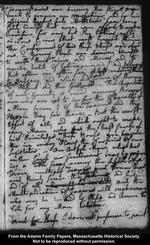
Circumstances are become the strongest Argument, to procure an Approbation, and for
[these?] assigned Reasons, such Multitudes have been lately licensed, that none can afford to make Provision, for any but the trifling, nasty vicious Crew, that most frequent them. The Consequences of these Abuses are obvious. Young People are
[illegible] tempted to waste their Time and Money, and to acquire habits of Intemperance and Idleness that we often see
[illegible] reduce
many of them to Beggary, and Vice, and
lead some of them
at last to Prisons and the Gallows. The Reputation of our County is ruined among Strangers who are apt to infer the Character of a Place from that of the Taverns and the People they see there. But the worst Effect of all, and which ought to make every Man who has the least sense of his
Priviledges tremble, these Houses are become in many Places the Nurseries of our Legislators; An Artful Man, who has neither sense nor sentiment may by gaining a little sway among the Rabble of a Town, multiply Taverns and Dram Shops and thereby secure the
Votes of Taverner and Retailer and of all,
who will be induced and the Multiplication of Taverns will make many who may be induced by Phlip and Rum to Vote for any Man whatever.
and for These I dare not presume to point
Page 8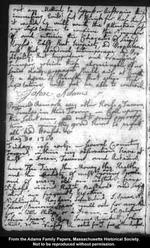
out any Method, to suppress or Restrain these increasing Evils; but I think for these Reasons it would be well worth the Attention of our Legislature, to confine the Number of, and retrieve the Character of Licensed Houses; least, that Impiety, and Prophaneness, that abandoned Intemperance, and Prodigality; that Impudence and brawling Temper, which these abominable Nurseries daily propagate, should arise at length to a degree of strength, that even the Legislature will not be able to
controul.
John Adams
Pownals Remark, every other House a Tavern. Twelve in this Town. Call upon the select men, and not to grant Approbation, upon the grand jurors to present all bad Houses, &c.
MAY 30 1760 FRIDAY.
Rose early. Several Country Towns, within my observation, have at least a Dozen Taverns and Retailers. Here The Time, the Money, the Health and the Modesty, of most that are young and of many old, are wasted; here Diseases, vicious Habits, Bastards and Legislators, are frequently begotten.
Nightingale, Hayden, Saunders, J. Spear, N. Spear, Benoni Spear, would vote for any Man for a little Phlip, or a Dram. N. Belcher, John Spear, O. Gay, James Brackett, John Mills, Wm. Veasey &c. voted for T. for other Reasons.
Page 9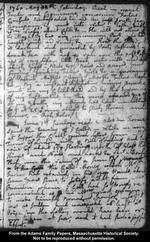
1760 MAY 31TH. SATURDAY.
Read in naval Trade and Commerce, concerning Factors, Consuls, Embassadors, &c., and the East South Sea Company, &c. [Went?] into Water. Talked with Wm. Veasey about Church &c. He will not allow that Dr. Mayhew has any uncommon Parts. He had haughty Spirits, and Vanity &c. -- How the judgment is darkened and perverted by Party Passions!
Drank Tea with Zab. Ran over the past Passages of my Life. Little Boats, water mills, wind mills, whirly Giggs, Birds Eggs, Bows and Arrows, Guns, singing, pricking Tunes, Girls &c. Ignorance of Parents, Masters Cleverly, Marsh, Tutors Mayhew &c. By a constant Dissipation among Amuzements, in my Childhood, and by the Ignorance of my Instructors, in the more advanced years of my Youth, my Mind has laid uncultivated so that at 25, I am obliged to study Horace and Homer. -- Proh Dolor!
JUNE 1ST. SUNDAY.
Read 2 Odes in Horace. Spent the Evening at the Coll.'s. While we were at supper, the Coll. received Letters from Mr. Turner of London, with a Bill of Lading and Invoice of about 150 sterlings worth of Glass and Hinges and Nails, and Locks &c. for a House. These were the Value of a sum of money of the Colls the Coll's. Money, which Mr. Turner had retained, in his own Hands, about seven Years since, to satisfy a Debt from Mr. Branden, whom the Coll. had so strongly recommended, as in Mr. Turners opinion to make himself Brandens sponsor. So that it was as sudden and unexpected at least as [a] Prize in the Lottery would have been, or one taken at sea; and it had such a joyful Effect.
Page 10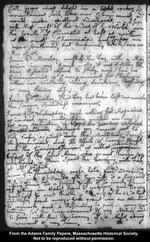
Coll. Grape vines delight in a [light?] rockey, and mountainous soil, like our Commons, which would make excellent Vineyards. -- I suppose that most of the Wines of the World, are the Growth of Climates at least as northern as ours.Champaign, and Tockay are more southward, but Burgundy &c. &c. &c. are northward of us.
JUNE 2D. MONDAY.
Wasted the Day, with a Magazine in my Hand. As it was Artillery Election, it seemed absurd to study, and I had no Conveniencies, or Companions for Pleasure either in Walking, riding, drinking, husling, or any thing else.
JUNE 3RD. TUESDAY.
This Day has been lost in much the same, Spiritless manner.
JUNE 4TH. WEDNESDAY.
Read nothing but Magazines as indeed an indisposition rendered me unfit for any Application. Spent the evening with Zab at Mr. Wibirts Discharged my Venom to Billy Veasey, against the Multitude, Poverty, ill Government, and ill Effects of licensed Houses, and the timorous Temper, as well as criminal [illegible] Designs of the Select Men, who grant them Approbations. Then Spent the Evening, with Zab, at Mr. Wibirts.
JUNE 5TH.THURDSDAY.
Arose late. Feel disordered. 8 o'Clock, 3 1/2 Hours after Sun rise, is a sluggard's rising Time. Tis a stupid Waste of so much Time. Tis getting an Habit hard to conquer, and Tis very hurtful to ones Health. 3 1/2, 1/7 of the 24, is thus spiritlessly dozed away. God grant me an Attention to remark, and a Resolution to pursue every Opportunity, for the Improvement of my Mind, and to save, with the Parsimony of a Miser, every moment of my Time.
Page 11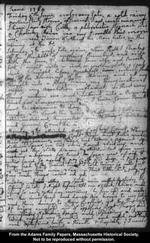
JUNE 1760 FRIDAY 6TH. JUNE.
Arose very late. A cold, rainy northeasterly storm, of several Days continuance. I have an ugly Cold, a phlegmatic stomach and a Cholicky Pain in my Bowells this morning. Read Timon of Athens, the Man hater, in the Evening at the Drs.
SATURDAY. 7TH.
Arose late, again. When shall I shake off the shackells of morning slumbers, and arise with the sun? Between sun rise, and Breackfast, I might write, or read, or contemplate, a good deal. I might, before Breakfast, [illegible] entirely shake off the Drowziness of the Morning, and get my Thoughts into a steady Train, my Imagination raised, my Ambition inflamed, in short every Thing within me and without, into a Preparation for Improvement. -- I have some Points [of] Law to examine to day.
SUNDAY, 8TH.
Spent the Evening and Night at the Coll's. in ill natured, invidious, Remarks upon Eb. Thayer, and Morals and General Court &c.
MONDAY. 9TH.
Attended Major Crosbeys Court. Where [illegible] Capts. Thayer and Hollis made their Appearance. Thayer had taken 2 Accounts of Nathan Spear, in his own Hand Writing, and got the Writts drawn by Niles. But upon my making a Defence for Hunt, Spear was afraid to enter and so agreed to pay Costs and drop. But poor Thayer had to say, several Times I told him so, but he would have his own Way. This little dirty, petty fogging Trade, Thayer carries on yet.
TUESDAY [10 JUNE].
[illegible] Altho my Spirits were wasted Yesterday, by sitting so late the Night before, (till one o'Clock I believe) and rising so early Yesterday morning, (by sun rise) and walking in the dewy Grass and damp Air, home to my fathers and then down to Major Crosbeys, yet the Thought of being employed, and of opposing
Captn. Thayer and punishing Nathan Spear, and Spreading a Reputation, roused my Faculties, and rolled out Thoughts and Expressions, with a strenth and Rapidity, that I never expected.
Page 12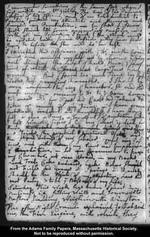
I remember something of the same sort, when I first waited on Mr. Gridley. The Awe of his Presence, a Desire of his Esteem, and of an Introduction to Practice, quickened my Attention and Memory, and sharpened my Penetration. In short, I never shall shine, till some animating Occasion calls forth all my Powers. I find that the Mind must be agitated with some Passion, either Love, fear, Hope, &c. before
the she will do her best.
I rambled this Afternoon with the Dr. over the Commons, and amused my self wit by clearing the Spring and climbing the Ledges of Rocks, thro the Apertures of which, the trees had large Trees had grown. But I spend too much Time, in these Walks, these amusing Rambles. I should be more confined to my Chamber. Should read and muse more. Running to Dr., to the Barn, down to meals and for Pipes and Coals and Tobacco &c. take up much of my Time. I have grown habitually indolent and thoughtless. I have scarcely felt a glow, a Pang, a Transport of Ambition, since I left Worcester, since I left my school indeed, for there the tricks, the prate and the Mischievous Tricks, the perpetual invincible Prate, and the stupid Dulness of my scholars, roused my Passions, and with them my Views and Impatience of Ambition. Let me Remember to keep my Chamber, not run Abroad. My Books, naval Trade, Coke, Andrews, Locke, Homer, should not Fields and Groves and Springs and Rocks should be the Objects of my Attention. Law and not Poetry, is to be the Business of my Life.
SATURDAY [14 JUNE].
This Week has been spent in Business, i.e. filling
Writts, and Journeys to Boston, Scadding, Weighmouth, Abington. The other Night Cranch explained, to Zab and me, the Fire Engine, with which they
Page 13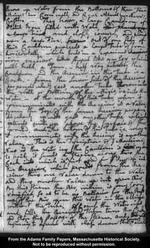
throw up Water from the Bottoms of their Tin Mines in Cornwall, and Coal Mines in New: Castle. They have a large Cauldron of Plated Iron, filled with Water,
and placed over a large fire and closely covered, and placed over a large Fire.
From Out of one side of this Cauldron, proceeds a large Tube of Iron horizontally, which Ends in a capacious
receiver iron receiver,
like shaped like an Egg, which will hold a Tun. Half Way between the Cauldron and the Receiver, in the Tube is a Cock. From the Lower Side of the Receiver perpendicularly goes another Tube, down into the Well or Bottom of the Mine, i.e. into the Water. At the mouth of this Tube, where it communicates with the Receiver is a Valve. From the Top of the same Receiver, perpendicularly upwards goes another Tube, which extends quite up above the surface of the Ground, and at the bottom of this Tube i.e. where it communicates with the Receiver, is another Valve. This is the Description of the Machine. Now when the Water in the Cauldron is
[first?] made to boil, it sends a
hot steem along,
thro the Cock
into which is first opened for that Purpose in the Receiver, which proceeds from the Receiver
thro one Valve down to the Water and
thro another Valve, up into open Air. By this steem the Air, within, is very soon rarified, so as to be no
Ballance for the Pressure of the Air, upon the Water in the Mine without the Tube. Of Course the Water rises and fills the Receiver. Then turn the Cock and stop the Passage of the Steem, and the Water beginning to descend will close down the
lower Valve.
Page 14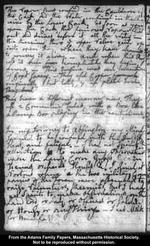
The
Vapour thus confined in the Cauldron by the Cock, and the Water confined in the Receiver by the Lower Cock, as soon as you open the Cock, the furious
Vapour flies out and drives before it, all the Water in the Receiver,
thro the upper Valve, quite up into open Day, where they have channells &c. to convey it away. And when this
Proscess is once
[illegible] compleated, they begin anew. This Engine was an Invention of
Capt. Savery. They used Copper
formerly originally, but lately, they use plated Iron.
They had
They have a different manner now. They Use a Concentric Tubes, with a Box, like a Pump Box playing in the central one.
In my journey to Abbington, my Mind seemed to be confused with the Dust and Heat, and fatigue. I had not Spirit and Attention to to make any Observations upon the Lands, Corn, Grass, Grain, Fences, orchards, Houses &c. I dined at Nortons where the two military Companies of the Town, were assembled to raise Voluntiers, Recruits, but I had not Spirits to make Observations, on the Landlord, or Lady, or Officers or soldiers or House, or any Thing. I eat Milk for Breakfast.
Page 15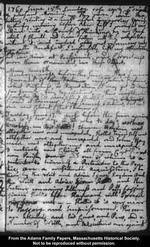
1760 JUNE 15TH. SUNDAY.
Rose early, 5 o clock. A pleasant Morning. The more I write the better. Writing is a most useful improving Exercise. Yesterday morning before Break fast I wrought my Mind into a Course of Thinking, by my Pen, which I should not have fallen into the whole day without it; and indeed often not resuming my Pen after Breakfast, I insensibly lost my attention.
Let me Aim at Perspicuity, and Correctness more than ornament, in these Papers.
MONDAY. JUNE 16TH.
Arose before the sun. Now I am ignorant of the fortune my Future Fortune, what Business, what Reputation, I may get, which is now far from my Expectations. How many Actions shall I secure this Day? What new Client shall I have? 6 Actions I found at Evening, I had secured 6 Actions, but not one new Client, that I know of.
TUESDAY. JUNE 17TH.
Arose before the sun again. This is the last day. What, and who
to day?
[illegible] Ebenezer Hayden was altogether new and unexpected. Hollis him self was altogether new and unexpected and John Hayward was altogether new and unexpected. 3 entirely new Clients, all from
Captn. Thayers own Parish,
one of and one of whom is
pretender to himself a Pretender to the Practice, are a considerable Acquisition. I believe, by the Writ and Advice I gave Hayden and the Writt and Advice
[illegible] and the Lecture, concerning Idleness and Petty fogging, given Hollis before Hayward will spread
[illegible] me. Hollis is very near to Beggary and Imprisonment. His oxen are attached, and his Cows, and Pew, and a Number of
Writts, and Executions are
[out] against
[him and]
Page 16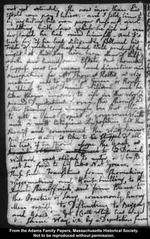
not yet extended. He owes more than his Estate can pay I believe. And I told him that by neglecting his own proper Business, and meddling with Law which he did not understand, he had ruined himself. And it is true, for if he had diligently followed his Trade of making shoes and lived prudently he might at this Day have been clear of Debt and worth an handsome Estate. But shomaking I suppose was too mean and dimitive
[diminutive] an Occupation for Mr. Thomas Hollis, as Wig making was to Mr. Nat Green, or House Building to Mr. Daniel Willard, and he like them in order to rise in the World procured Deputations from the Sheriff, and after serving long enough in that office to gett a few Copies of common
Writts and a most litigious Disposition, left the Sheriff and commenced the Writt Drawer. But poor Hollis is like to be stripped of all he has, if he should escape the Goal,
Daniel Willard made [illegible] which Daniel Willard was obliged to enter, and if he should not be forced to fly like Nat Green. These sudden Transitions from shomaking, Wigg making and House building, to the Deputy Sheriffwick; and from thence to the Practice of Law, commonly hurry Men rapidly to Destruction to Beggary and Goals. Yet
Coll. White has rose the same Way, i.e. by a Deputation from
Page 17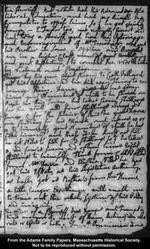
the Sheriff. But White had the Advantage of a liberal Education, and had as Rival no Competitor to oppose him, so that he got quickly sworn. E. Taylor too, was naturally smart, and had
been long a sheriff, and had the Patronage and Encouragement of Mr. Trowbridge, who was his Brother in Law. Applin and Ruggles are in a higher Class, men of
great Genius and great Resolution, to combat the World both by Violence and stratagem.
Thayer by his own abject slavery to Coll. Pollard got his Affection and he did every Thing to encourage him. Dana gives him has given him great Numbers of Writts to be served on People in this Town, he takes seven shillings for the Writt, and four shillings always, and some [times] 5 for the service; of this he gives Dana one shilling for his Blank, and reserves 10 or 11 to himself; great Numbers of Writts he has filled himself, and those which he durst not fill he got Niles to fill for 3 shillings so that he takes 3, and four is seven and often times Eight shillings to himself. Thus from Coll. Pollard, from Mr. Dana and Elisha Niles he has got his Estate, as his Legislative Authority, as basely got as Bestia's from the Throne. A little longer Experience will enable me to trace out the whole system of his Policy and iniquity.
The office of a sheriff, has Dangers and Temptations around it. Most of them decline, in Morals or Estate or both. Saml. Penniman is one.
Page 18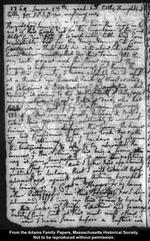
1760 JUNE 18TH.
Read but little, thought but little, for the N.E. storm unstrung me.
THURDSDAY JUNE 19.
I have been the longer in the Argt [Argument] of this Cause not for the Importance of the Cause itself, for in itself it is infinitely little and contemptible, but for the Importance of its Consequences. These dirty and ridiculous Litigations have been multiplied in this Town, till the very Earth groans and the stones cry out. The Town is become infamous for them throughout the County. I have absolutely heard it used as a Proverb in several Parts of the Province, "as litigious as Braintree." And this Multiplicity is owing to the Multiplicity of Petty foggers among whom Captn. Hollis is one, who has [illegible] given out that he is a sworn Attorney till 9/ 10 of this Town really believe it. But I take this Opportunity, publickly to confront him, and undeceive the Town. He knows in his Conscience that he never took the Oath of an Attorney, and that he dare not assume the Impudence to ask to be admitted. He knows that the Notion of his being a sworn Attorney is an Imposture, is an Imposition upon this Town. And I take this opportunity publickly to declare that I will take all legal Advantages, against every Action brought by him or by Captn. Thayer or by any other Petty fogger in this Town. For I am determined if I live in this Town to break up this scene of strife, Vexation and Immorality. (Such suits as this and most others that ever I have seen before a justice in
Page 19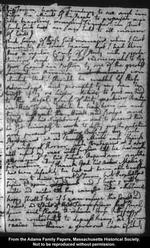
this Town, have a Tendency to vex and imbitter the Minds of the People, to propagate an idle, brawling, wrangling Temper, in short such suits
[illegible] are an Inlet to all manner of Evils.)
And some [i.e. one] of these suit managers, when I first came to this Town, hearing that I had been thro a regular Course of study with a regular Practitioner, and that I was recommended to the Court in Boston, by one of the greatest Lawyers in America, and knowing concluded, that I should be enabled by these Advantages, and prompted by my own Interest if by no higher Motive, to put an End to the illegal Course of dirty, quacking Practice in this Town, which he had been in, and thereby enslaved the Minds and Bodyes and Estates of his Neighbours. And to prevent this he set himself to work to destroy my Reputation and prevent my getting Business, by such stratagems as no honest Mind can think of without Horror, such stratagems as I always will resent, and never will forgive till he has made Attonement by his future Repentance and Reformation. I thank God his action Malice has been defeated, he has not been able to enslave me, nor to drive me out of Town, but Peoples Eyes begin to open, [illegible] and I hope they will open wider and wider till they can see like other Towns. Happy shall I be if I can rescue the Souls and Bodies, and Estates of this Town from that Thraldom and slavery, to which these Petty foggers have contributed to depress them; and if I can revive in them a generous Love of Liberty
Page 20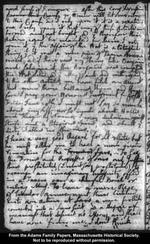
and sense of
Honour. -- After this long Digression
from this Cause your
Honour will let me return to this Cause, and I rely upon it, it is a vexatious one. I rely upon it that many of these Articles were borrowed and not bought, and that therefore this Action cant be maintained for them. I rely upon it, that the Affair of the Hat is a litigious Thing, that it was a mere piece of Tavern Amuzement, and if there was any Thing like Bargain and sale in it, the Bargain was completed, the Hat delivered and the Money paid, and with regard to the other Articles, we have filed an Account that more than ballances them, and therefore I pray your
Honours Judgment for Costs.
FRIDAY JUNE 20TH.
I must not say so much about my self, nor so much about Hollis and Thayer by Name. I may declaim against Strife, and a litigious Spirit, and about the dirty Dablers in the Law.
I have a very good Regard for Lt. White, but he must allow me to have a much greater Veneration for the [forms of?] Law. To see the Forms and Processes of Law and justice thus prostituted, (I must say prostituted) to revenge an imaginary Indignity, offered in a Tavern over a Chereful Bowl or enlivening Mug. To have a mere Piece of Jocular Amuzement, thus hitched into an Action at Law, a mere frolick converted into a Law suit, is a Degree of meanness that deserves no Mercy and shall have none from me. I don't think
Page 21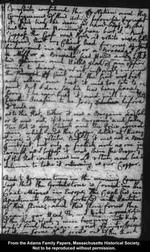
Lt. White considered the Nature and the Consequences of this Action, before he brought it. If he had he never would have
brot it. He has too much
Honour to have
brot it. But I suppose the Case was this. Lt. White was a little chagrined, that my Client had for once outwitted him, and in a Miff, or a Bravado, I say a Miff or a Bravado, sees Hollis and asks his Opinion. And Hollis glad of an opportunity to draw a Writ, instantly encourages the
[illegible] suit, and the suit was
brot. And when once
brot, it was too late to repent. But I dare say he has been severely sorry, that he ever
brot it, and will have still further Occasion to be sorry before it Ends.
As to the Hat, Either it was a Bargain and Sale or it was not. If it was a Bargain and sale, The Hat is my Clients and the Price agreed upon, which was the Copper, delivered at the very Time, is Lt. Whites. But if it was not a Contract, but only a frolick and no one in Earnest, as I suppose it was, then the Property of the Hat continues in Lt. White, and he is welcome to take it, returning us our Copper.
Rode to Germantown in the morning. Cranch says that the Grindstone is found in the Coal Mines in Europe. The Coal lies in Apartments, strongly fortified with Partitions of this stone, and this stone forms the Covering over Head, &c. I took a good Notice of the Rock Weed, they were burning into Kelp and I find there are a great Variety of Species of it. Some of it grows out of the Rock,
Page 22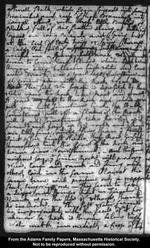
a small stalk, which soon spreads into several
Brainches, and each of those Branches into several others, with those little Bubbles or Bladders, full of Air, scattered along at little Distances, on every Branch and Sprig, but at the End of Each twigg or Sprig, hangs a large Pod, full of
a spongy substance seed incased in a spongy substance. We went down to some large stones, which had been thrown over between high Water and low water mark 2 or 3 Years ago. These stones are all grown over with the Rock Weed
[illegible] . The seed, We suppose is deposited by the Water upon the Rock, takes Root and grows. It grows very fast to the Rock and when you pull, you will sometimes break the stalk, sometimes pull off a flake of the Rock with it, and sometimes take the Weed, as it seems to me, fairly up by the roots, and the Roots are little fine Spiculae, finer than the Point of the finest Needle. These Roots insert themselves into the Pores of the Rock and thence draw Nourishment. And the connoiseurs say, that some Rocks will produce Weeds, large and rank and strong, while others, laid in the same Place at the same time, will produce only a
meagre, short, lingering one. They seem to take a deeper and stronger Root, in Timber and Planks, as on the sides of Wharfes, than they do in Rocks. The salt Water seems to be impregnated with the seeds of it, for whenever a Rock is thrown below high Water mark, immediately a Crop of these
Page 23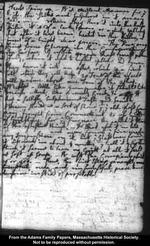
Weeds Spring up. It is excellent Manure for the Soil. The salts and sulphurs in it are very good. When they
thro it into the Kelp Kiln, it is of a dark brown, or a dirty Yellow, but after it has been heated in the Kiln, it turns of a bright clear green. The Fire occasions some Change in the Configuration of the surface, that reflects green Rays most plentifully, where it used to reflect yellow and brown. They burn it into an ashes, which is a fixed salt, which they call Kelp. 20 Tons of the Weeds will produce about one Ton of the ashes. It tastes a little like Gun powder, it smells like marsh Mud, like a muddy Creak, &c
[illegible] . It has a saltish, sulphurous Taste and Smell. -- The Deacon
shewed us a Sort of Stone, that the old Glass Company brought from Connecticut, to use instead of Grindstone, for the furnace. He called it stone of the asbestus Kind.
Dr. Eliot used it in his and never found the fire made any Impression on it. But the Glass men found it dissolved in about 4 months. They call it a Cotten stone. It seems to have no Gritt at all, it feels as soft as soap. It cost the Company about
[illegible] or 900. -- Thus, the first Essays, generally
[illegible] rude, and unsuccessful, prove burdensome instead of profitable.
Page 24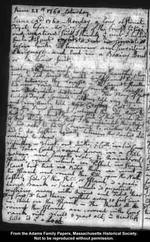
JUNE 21ST. 1760. SATURDAY.
JUNE 23RD. 1760. MONDAY.
A long obstinate Tryal, before Majr. Crosby, of the most litigious, vexatious suit, I think that ever I heard. Such Disputes [illegible] begin with ill humour and scurrilous language, and End in a Boxing Bout or a Law suit.
TUESDAY. 24TH. JUNE.
Arose early, a very beautiful Morning. Zab. seems to make insufficient Distinctions between the Vowells. He seems to swallow his own Voice. He neither sounds the Vowells nor Articulates distinctly. The story of Yesterdays Tryal, spreads. Salisbury told my Uncle and my Uncle told Major CrosbyColl. Quincy. They say I was saucy, that I whipped the old Major, &c., that I ripped about the Law suits of this Town And of that House, and that I reminded the Majer of his oath to be of Council to neither Party, and to do justice equally between the Parties according to Law.
WEDNESDAY [25 JUNE].
Went out with the Coll., in his Canoe, after Tom Codd. Rowed down, in a still calm, and smooth Water, to Rainsford Island, round which we fished in several Places, but had no Bites. Then we went up the Island, and round the Hill. Upon the North Easterly side of the Hill, or Island, is a prodigious Bank or Head, which is perpetually washing away, with Rains and Tides. Heartley says it has been washed away 10 feet since he lived on the Island. The Rocks all round the Island are covered with long, rank, rich Weeds, 3 Years old, which Heartley sells at 5s. a Load.
Page 25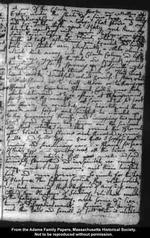
At one of the Clock we took our Mutton and Cyder, under the shade of a fine Tree, and laid our Provisions on a large flat stone which answered for Table, Dish and Plate, and then we dined expecting with much Pleasure an easy sail Home before the Wind, which then bread fresh at East. After Diner we boarded and hoisted sail, and sailed very pleasantly a Mile, when the Wind died away into a Clock Calm and left us to row against the Tide, and presently against the Wind too for that sprung up at south, right a Head of us, and blew afresh. This was hard work. Doubtful what Course to steer, whether to Nut Island, or to Half Moon, or to Hangmans Island or to Sunken Island,Coll. Q. grew sick which determined us to go ashore at Hangmans for that was the nearest. As soon as he set foot on shore he vomited, very heartily, and then weak and faignt, and spiritless, he crawled up to the Gunning House, and wrapping his great Coat round him, lay down on the sea weed and slept, while I rambled round the Island after Weeds and flowers and stones and young Gulls and Gulls Eggs. 500 Gulls I suppose hovered cawing and screaming over the Island, for fear of their Eggs and Young ones, all the time we were there. When the Coll. [illegible] awoke and found himself strengthened and inspirited, we rowed away, under Half Moon, and then hoisted sail and run home. So much for the Day of Pleasure, The fishing frolick, the Water frolick. We had none of the Pleasure of Angling, very little of the Pleasure of Sailing. We had much of the fatigue of Rowing, and some of the Vexation of Disappointment. However the Exercise and the Air and smell of salt Water is wholesome.
Page 26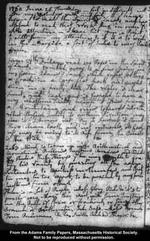
1760. JUNE 26. THURDSDAY.
Feel indifferently well after my yesterdays walk and sail. I have begun to read the Spirit of Laws, and have resolved to read that Work,thro, in order and with Attention. I have hit upon a Project that will secure my Attention to it, which is to write in the Margin, a sort of Index to every Paragraph.
JUNE 27TH. FRIDAY.
Read 100 Pages in the Spirit of Laws. Rambled away to a fine Spring in my Cozen Adam's Land, which gushes thro a Crack in a large flat Rock and gurgles down in a pretty Rill. The Water is clear, sweet, and cool, and is supposed to have a very wholsome Quality, because it issues from a Mountain, and runs towards the North. What Physical Quality its northern Direction may give it, I know not. By its sweetness it flows thro clean Earth, and not minerals. Its Coolness may be owing to its Rise from the Bowells of the Hill.
Zab's Mind is taken up with Arithmetical and Geometrical Problems, Questions, Paradoxes and Riddles. He studies these Things that he may be able to gratify his Vanity by puzzling all the vain Pretenders, to Expertness in Numbers, and that he may be too expert, to be puzzled by any such Questions from others.
There is a set of People, whose Glory, Pride &c. it is to puzzle every Man they meet, with some Question in the Rule of three or fractions, or some other Branch of Arithmetic. Jed. Bass. Moses French. Tom Peniman, &c. &c. Smith, Richard Thayer, &c.
Page 27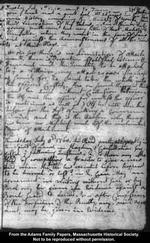
TUESDAY. JULY 1 ST. 1760.
Went to Town.
Mr. Thatcher. You have read a great deal, Mr. Adams, in the Roman History, concerning the Modesty of Youth, and their Veneration of the Elders. Now I think these young Gentlemen had very little of that Modesty and Veneration, when they went in the face of Law and against the Remonstrances of all the Elders to act their Plays.
Mr. Otis says there is no Limitation of Attachments. There is no Proportion established between the Demand and the Quantity to be attached, so that a Villain may attach 20,000, if he pleases as security for 20, and take the whole into the Officers Custody. Tho on second thought, this cant be done without Collusion between the Plaintiff and the officer, for unless the officer is malicious as well as the Plaintiff, he will run the Risque for the Defendant, of making a Common Service, and this is the Reason why there has been no Mischief made of the unlimited Power of Attachment.
THURDSDAY JULY 3RD. 1760.
Read pretty diligently in the Spirit of Laws. -- Hayden's Consultation suggested the following Questions. Q. Is there any Method of compelling a Grantor to give a new Deed when the Deed he has executed before happens to be burned or lost?-Q. May an Agreement in Writing without seal, or by Parol only be given in Evidence against a Bond sealed and delivered? After Confession of the Forfeiture of the Penalty, any Special Agreement may be given in Evidence.
Page 28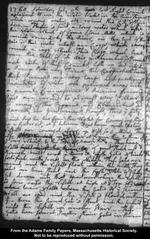
1760. SATURDAY JULY 5TH.
[illegible] Last Night Cranch explained to me, the Water Works in the River Thames which convey water, all round the City of London. There is first, a long water Wheel, like the Water Wheel of some saw Mills, which is carried round by the River. On the End of the Axis of this water Wheell are Coggs, which carry round a cogg Wheel. This Cogg wheel has upon the End of its Axis, a Number of Cranks and each of these Cranks lifts up and lets down a Pump Box every Time the Cogg wheel Turns. These Pumps are very large, and prodigious Quantities of Water are pumped away into a general Conveyance and Receiver, from which Pipes are carried to almost every Cellar and to many of the Rooms, and Chambers, and Garrotts, in Gentlemens Houses, thro the City. Cranch says he has seen the Works for Conveying ships up a Cataract, as that between Topsham and Exeter. Vessells are conveyed along, up Hill, so 3 Miles. They rise [illegible] up hill as far as from the Bottom of the long Wharf to the Top of Bacon [Beacon] Hill. They have Walls [illegible] of great Thickness and strength built across the River Ex, with Gates, of Timber fortified with Irons, in the Middle. These Gates are opened, and the Vessells float, within the Wall. The gates are then shut, and the fresh running Water of the River let down into that Apartment where the Vessell is which soon raises the Vessell as high as the Top of the [illegible] lower Walls when the Gates of the second Wall are opened and the Vessell is floated within that. Then the second Gate is shut, and the freshit raises the Vessell up another stair.
These Gates have several smaller sluice Gates in them
Page 29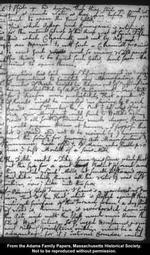
that slide up and down. These they slide up, and let out as much Water as they can, before they pretend to open the Great Gates.
This whole Passage and Conveyance is artificial, for the natural Course of the River was at some Distance. This whole Channell was cut by Art , and. What an Expence! to cutt such a Channell for 3 miles, to erect such Walls and so many Walls across the River, to build such Gates, and such Machines to open them.
Invention has laid under Discouragements in England, for Inventions to facilitate any Manufacture, by which Numbers of People might be thrown out of Business have been prohibited by Act of Parliament. Saw Mills for that Reason were prohibited, That a greater No. of Hands might be employed in sawing, by Hand, Boards and Timber &c. But that Act was of no service. Our Merchants could send to Holland and buy Boards and all sorts of Timber much cheaper, than they could procure them at home. I suppose the Act is expired, and not to be revived, by the Encouragement the society for Encouraging Arts, Manufactures and Commerce, have offered to the Man who shall produce the best Modell of a saw Mill.
The Dutch erected a Dike, some Years since, which shut out the sea for a great [illegible] Extent of Land, and they erected Wind Mills, at small Distances upon this Dike, which threw all the Water that was left within, over the Dike into the Sea.
Deacon Palmer's Glass Furnace, it seems is a reverberating Furnace. That is, the Heat, which is flashed against the internal surface of the Furnace, when a dry stick of Wood is thrown in, is reverberated, down into the Pots, and melts the Glass, much more than the silent Heat below. So that, rugged Excrescences, prominent Bits of Grindstone, within must be a disadvantage, for if the internal Concave could
Page 30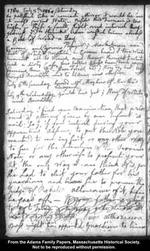
be polished like a concave Mirror, it would be in its most perfect state. Besides this Furnace is too high. These 2 faults,
Hight and internal Ruggedness, the Deacon thinks have wasted him almost a Cord of Wood a Day.
Cowen and Young Thayer the Marketman are full of White and Bowditch. Cowen heard I tore Whites account all to Pieces, and Thayer thought that White had a dirty Case. Few Justices Causes have been more famous, than that. Isaac Tyrrell [Tirrell] had the story too, but he thought Bowditch was to blame, was abusive.
JULY 6TH. SUNDAY.
Heard Mr. Mayhew of Martha's Vineyard.
JULY 9TH. WEDNESDAY.
Gould has got the story of White and Bowditch.
SATURDAY [12 or 19 JULY].
I find upon Examination, that a Warrant of Attorney given by an Infant is void; so that, if you intend during your Apprentices Absence, to put the Note you mentioned to me in suit, or
my other way to sue for the Detention of the Province Note, or any other wise to prosecute your Right, the only Way I can think of is, for the Lad to elect your father for his Guardian and
have see to procure the judge of Probates allowance of it, before he goes off.
If your father is unwilling to go to Town, you may ride down and wait on this judge.Altho Deacon Bass might
have been appointed Guardian to him
Page 31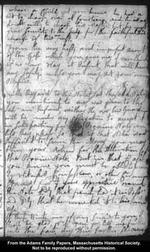
when a Child, yet you know he has a Right to choose one at fourteen, and he is no doubt willing to choose his Master, but he must give security to the judge for the faithful Discharge of his Trust.
From the very hasty and imperfect Account of the Case which you gave me, I can think of no other Way at Present, that will have any Safety. So you may Act your own Pleasure.
With Regard to the Notes, as the old Note you mentioned to me, was given to the Lad an Infant, neither He nor his Guardian will be under any Obligation to accept it in Satisfaction for the Province Note, unless they please. So that if that Note is not sufficient to secure the Money, you may bring your Action for the Detention of the Province Note. But in that Case you know you must be able to prove by Witnesses, Confession, or other Circumstances, first that your Apprentice owed the Note, 2dly that French had it in Possession, and idly that he converted it to his own Use.
If these Hints are of any service to you, I shall be glad, or if, upon your letting me further into the facts, any Thing further should occur
Page 32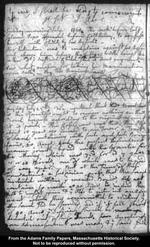
to me, I shall be ready to communicate it.
Yr. svt., J. Adams
SUNDAY MORNING [13 or 20] JULY 1760.
The week before last Salome Pope appeared before Coll. Quincy, to confess herself with Child, by Jos. Ryford.
Her Intention was to complain against Jos. Ryford and charge him before the justice with being the father of the Bastard Child with which she is now pregnant. Now what Occasion for taking her Examination upon Oath?-By the Province Law.
[illegible]
FRYDAY JULY 25TH.
We contend that
[illegible] the Plaintiffs ought to recover nothing on this Bond, because according to the original Agreement it is paid. The Case was this. The Plaintiffs about 15 years ago conveyed to one Tower, a Tract of Land, containing with such and such Boundaries, 30 Acres. And the present Defendants became jointly bound with the Grantee for the Money, which was 750, for which they gave 8 or 10 Bonds, one of which was to be paid off every Year. But at the Time of these Transactions, a suspicion arose, that the Land included within the mentioned Bounds, did not contain so much as 30 Acres, which induced the Defendants to insist upon and the Plaintiffs to enter into an Agreement which they committed to Writing, that the Land should be surveyed, and if it fell short of 30 Acres, the Deficiency should be
[illegible] deducted out of these Bonds.
[illegible] Accordingly an Admeasurement was made, and the Land fell
Page 33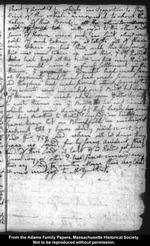
short 7 Acres and 1/2, which in Proportion to the Price of the whole amounted to about the Value of this Bond.
[illegible] With regard to the other Bonds some of them were put in suit, others were paid off and taken up, at length all of them were taken up, but this, and the Reason why this was never taken up was this. The Plaintiff
Hollis who had kept all the Bonds in his own Hands never would come to a final settlement with them. The
[young Man?] Grantee had made several Payments, and Tower had made several more and Hayden had made several others. Some of these Payments were minuted on the Bonds, but many of them were made abroad upon Hollis Promise to enter them on the Bonds when he went home which was never done, so that these People
[illegible] being Brothers to Hollis and confiding in his Honor have been let
[led] on Blindfold, in midnight Darkness, till they have already paid 12 or 1500 Pounds for 750, and when all is done they have no Land. For by some Accident the Deed of this Land is lost, of which Hollis got scent some way or other and has since conveyed away this very Land to another Man. This very land is now mortgaged to
Mr. Gt. [Goldthwait]
Page 34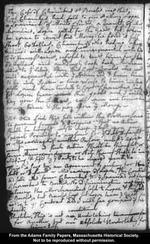
The Case of Chambers vs. Bowles was this.Capt. Chambers had sold to one Anthony Lopez a Spaniard of Monto Christo, a Quantity of Merchandizes. Lopez called for the Goods, but when he came to count his Money he found it fell short, 60 Dollars. Chambers, who had no other Dealings with Lopez and was unacquainted with his Circumstances, refused to trust him for the 60 Dollars, and accordingly took back Merchandizes, to that Value. Upon this Captn. Bowles, who was well acquainted with the Spaniard, and knew him to be rich, spoke a few Words to him in Spanish and then turning to Captn. Chambers, said, let Lopez have [illegible] the goods and I will pay you the Dollars; call upon me tomorrow or any time and Ile pay you the Money.
Mr. Otis said this fell within the Province Law to prevent frauds and Perjuries "that no Action shall be brought whereby to charge the Defendant upon any Special Promise to answer for the Debt, Default or Miscarriages of another Person, unless the Agreement upon which such Action shall be brought, or some Memorandum or Note thereof shall be in Writing, and signed by the Party to be charged therewith," &c. This is, says he, an Agreement to answer for the Debt or Default or Miscarriage of Lopez. The Contract and sale was from Chambers to the Spaniard, not from Chambers to Bowles. No Discrimination was made between the Merchandizes sold to Lopez and these sold to Bowles, but Bowles says let Lopez have the Goods according to your Contract and I will see you paid if he dont.
Thatcher. This is not a conditional Undertaking [illegible] for Another, but an absolute Undertaking for himself.
Page 35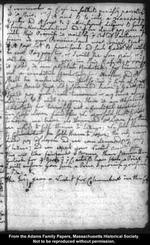
I remember a Case in Salkeld precisely parrallel which is this. "A and B go into a Warehouse together and A says to the Merchant, deliver B such and such Merchandizes, and if he dont pay you I will. This Promise is void by the Act of Parliament from which our Province Law was copied. But if A says Let B have such and such Goods and I will be your Pay master, or I will see you paid, or I will be answerable to you, in this Case A's promise is good, is an absolute Undertaking for himself not a conditional Undertaking for Another, and A shall be answerable. -- Just so in the Case at Bar. Captn. Bowles says, Let the Spaniard have the Goods and I will pay you, call tomorrow or any time at my Lodgings and I will pay you. Here is an Absolute Undertaking for himself, not a Conditional Undertaking in Case Lopez failed, for We never sold these Goods to Lopez, we have no Demand vs. Lopez for them, we refused to sell them to him: We sold them to ChambersBowles, he sold them to Lopez; He only can demand pay of Lopez and we can demand pay only of him; and we expect your Verdict accordingly. -- This was like Fairbanks v. Brown. There Brown Undertook for the [Govt.?], that the Carter should have such a Price. I will ensure You such a Price. I promise you such a Price, &c.
The jury gave a Verdict for Chambers in this Case.
Page 36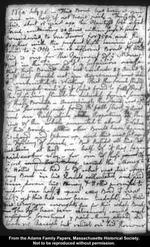
1760. JULY 26.
This Bond has been at
[least] once and an half, if not twice, paid. The Case is this. About 15 Years ago, the Plaintiffs sold a tract
[of] Land, containing 30 Acres, within such and such Boundaries, to one Tower, for 750, and He together with the present Defendants became jointly bound to the Plaintiffs, in 10 different Bonds, of which this is one, for the Payment of the Money. But in the Time of it, a suspicion arose that those Bounds did not include 30 Acres; and least they should not an Agreement was made and committed to Writing, that the Land should be surveyed, and if it was found to fall short the Deficiency should be deducted from some of these Bonds. Accordingly the Land was afterwards surveyed, and found to fall short, 7 Acres and an half, which
at the in Proportion
of to the Price of the whole amounted to about the Value of this Bond. All the other Bonds have been discharged and taken up, and this was set against the Deficiency of Land. But Besides all this
[illegible] , at least one half of it has been paid another Way. For one of these
[illegible] Obligers carried the Money to Hollis and had 1/2 of what was due upon every Bond in his Hands callculated, and paid him down his Money, and Hollis promised to indorse one half, upon every Bond that was left: yet this has never been
indorsed; and Hollis has assurance enough to sue for this whole Bond. The Defendants have been
extreemely careless, and negligent. Sometimes they paid Money abroad, and took no Receipts, but relied on his
Honour
Page 37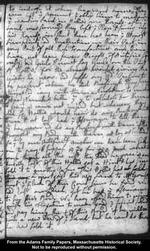
to indorse it when he went home. They even left the Agreement that obliged him to make up the wanting Land, in Hollis's own Hands; after the Land was surveyed they left the Plan and survey in his Hands, in short there has been the Utmost Simplicity and Inattention on their Part in every Part of all these Transactions; and there have not been fewer Proofs of Artifice, secresy, and Guile, I must say Guile, on the Part of Hollis, for He always avoided giving Receipts; he never would suffer any 3d Person to be present, when he did Business. They sometimes would carry with them a
Neighbour [who] understood Numbers, better than they, to calculate for them and see that they were not injured, but whenever they did so Hollis would never do any Business with them and at last had the Assurance to tell them that he never would do any Business with them if they brought any Body with them, as long as he lived. So that by one Artifice and another we have been led on to pay, I suppose, 1500 for 750, and what is worse than all the rest, the Deed he gave is accidentally lost. Of this Hollis got a Hint, and has since sold it to another Person. This Hollis has
[illegible] mortgaged this very Land to
Mr. Gouldthwat, the Clerk of this Court, since he found We had lost our Deed. Yet he has the assurance to sue this
[Bond?]. We have offered him to relinquish his obligation to make good the deficient Land and pay him the 1/2 of this Bond, if he will execute a new Deed of the Land; but he cant do that. He has sold it.
Page 38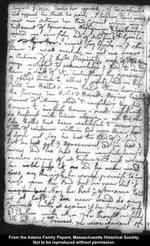
AUGUST 3D. 1760.
Hollis has appealed. If he prosecutes his Appeal, he shall be paid. I believe there never was an Action in this Court where more Instances of Ignorance, Negligence and Inattention appeared on one side, and of Artifice,
Secresy and Guile
[illegible] I must say Guile on the other, since it was erected. Let me draw a Picture of the Defendants stupidity, and of Plaintiffs Knavery. Neglect to acknowledge the Deed, to record it. Then the Loss of it, intrusting the Agreement that obliged him to allow the wanting of Land on these Bonds, in Hollis's own hands; then leaving the survey, in Hollis's Hands. Paying him sums of Money abroad, and confiding in his
Honour to indorse them-and consenting to do Business with him alone. On the other side Hollis has been watchful to draw every Tittle of evidence within his own Power
[illegible] . I dare not say he has the Deed of the Land but he has got the Agreement, and he has the survey and he has been careful never to receive money of us before Witness when he could help it, and he never would give any Receipts. He would promise to indorse upon the Bond but he never did it.
[illegible] Nay he had the assurance to tell us at last, that he never would do any Business with us again, if we brought any 3d Person with us. We thought ourselves ill used several Times. We were ignorant of
Page 39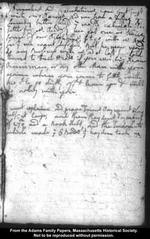
Numbers and Calculations, can but just write our Names, and we had a Desire that somebody better skilled than we should calculate and settle for us. Accordingly we got once or twice some of our
Neighbours, to go with us And see that we want defrauded. But he never would do any Business with us, and at last he told them to their Heads, if you ever bring Deacon Penniman, or any other Man with you again when you come to settle with me, I'le go directly off and leave you and will do nothing with you.
I must explain and prove Towers Payment of one half, at large, and then Haydens Payment of .270, and a Book Debt, and the Indorsements which made the 6 Bonds that Hayden took up.
Page 40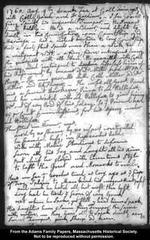
1760.AUG. 9TH.
Drank Tea at Coll. Quincys, with Coll. Gooch and Dr. Gardiner. I see Gooch's fiery Spirit, his unguarded Temper. He Swears freely, boldly. He is a Widower, and delights to dwell, in his Conversation, upon Courtship and Marriage. Has a violent aversion to long Courtship. He's a fool, that spends more than a Week, &c. A malignant Witt. A fiery, fierce outragious Enemy. He quarrells with all Men. He quarrelled with Coll. Quincy, and intrigued to [illegible] dispossess him of his Regiment, by means of Dr. Miller and Mr. Apthorp. He now quarrells with Coll. Miller and Dr. Miller and Eb. Thayer. He curses all Governors. Pownal was a servant, Doorkeeper, Pimp to Ld. Hallifax, and he contracted with Ld. Hallifax to give him 15s. out of every Pound of his salary. So that Pownal had 25 pr. Cent Commissions, for his Agency, under Ld. Hallifax.
Thersites in Homer, was,
Aw'd by no shame, by no respect controuled
In scandal busy, in Reproaches bold:
With witty Malice studious to defame
Scorn all his joy and Laughter all his Aim.
But chief he gloried with licentious style
To lash the Great and Monarchs to revile.
Thus we see that Gooches lived, as long ago as the siege of Troy.
Spleen to Mankind his envyous Heart possesst
And much he hated all, but most the best.
Long had he liv'd the scorn of every Greek
Vext when he spoke, yet still they heard him speak.
His daughters have the same fiery Temper; the same witty malice. They have all, to speak decently, very smart Tempers, quick, sharp, and keen.
Page 41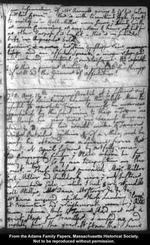
An Insinuation, of Mr. Pownals giving 3/4 of his salary for his Commission. -- This is with licentious style Governors to revile.Coll. Miller can serve the Devil with as much Cunning, as any Man I know of, but for no other Purpose is he fit. -- This is in scandal busy, in Reproaches bold.
Gardiner [illegible] has a thin Grashopper Voice, [illegible] and an affected Squeak; a meager Visage, and an awkward, unnatural Complaisance: He is fribble.
Q. [Query] Is this a generous Practice to perpetuate the Shruggs of Witt and the Grimaces of Affectation?
1760.AUG. 12TH.
Remonstrated at the sessions vers. Licensing Lambard, because the select Men had refused to approbate him, because he never was approbated by the select men, to keep a Tavern in the House he now lives in, because there are already 3 and his would make 4 Taverns besides Retailers, within 3/4 of a Mile, and because he obtained
an a License from that Court, at April sessions, by artfully concealing his Removal from the Place where he formerly kept, and so by an Imposition on the Court. These Reasons prevailed. Majr. Miller,
Coll. Miller and Ruddock, were the only justices on Lambards fide, while I had 8 or 9, Wendells,
Coll. Phillips, Mr. Dana, Mr. Storer &c. &c. &c. Mr. Dana enquired, whether those Landing Places at Braintree and Weighmouth
[illegible] or the Road
[illegible] where these 4 Taverns stand was not a great stage for Travellers. I answered no, and rightly, for the greatest stage that I knew
Page 42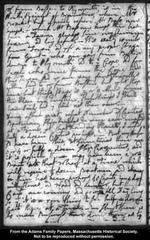
of from Boston to Plymouth, is in the North Precinct of Braintree, where Mr. Bracket, but especially where Mr. Bass now keeps. Where Mr. Bass now keeps, there has been a Tavern, always since my Remembrance, and long before. It is exactly 10 miles from Town, and therefore a very proper stage for Gentlemen who are going from Boston down to Plymouth, and to the Cape, and for People who come from the Cape, towards this Town. And there are very few Travellers either bound to or from Boston, but what stop here, but this stage is 2 or 3 Miles from the Place in Question. These Things I should have said, but they did not then occur.
Dana asked next, what Number of Carters, Boatmen, Shipbuilders &c. were ever employed at a Time, at that Landing Place? I answered half a dozen Carters perhaps. But my Answer should have been this. At some times there are 3 or 4. or half a dozen Ship Carpenters, and it is possible there may have been 2 or 3 Boats at that Wharf at a Time, which will require 1/2 dozen Boatmen, and
[illegible] there has been perhaps 40 Carts in a day with stones, and Wood and Lumber, but these Carts are coming and going all Day long so that it is a rare thing to see half a dozen Carts there at a time. In short there is so much Business done there, as to
Page 43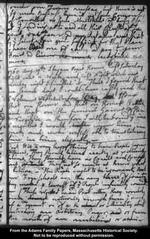
render one Tavern necessary, but there is not so much Business, there is no such Concourse of Travellers, no such Multitudes of busy People at that Landing as to need all this Cluster of Taverns. One Tavern and one Retailer was
tho't by the select Men quite sufficient for that Place. They have Appointed one of each, and pray that your Honors would
[illegible] recognize no more.
1760 AUG. 19TH.
I began Popes Homer, last Saturday Night was a Week, and last Night, which was Monday night I finished it. Thus I found that in seven days I could have easily read the 6 Volumes, Notes, Preface, Essay and Essays, that on Homer, and that on Homers Battles and that on the funeral Games of Homer and Virgil &c. Therefore I will be bound that in 6 months I would [illegible] conquer him in Greek, and make myself able to translate every Line in him elegantly.
Prat. It is a very happy Thing to have People superstitious. They should believe exactly as their Minister believes. They should have no Creeds and Confessions
of Faith. They
should not so much as know what they believe. The People ought to be ignorant. And our Free schools are the very bane of society. They make the lowest of the People infinitely conceited. (These Words I heard Prat utter. They would come
[illegible] naturally enough from the mouth of a Tyrant or of a K
[King] [illegible] or Ministry about introducing an Arbitrary Power; or from the mouth of an ambitious or avaricious
Page 44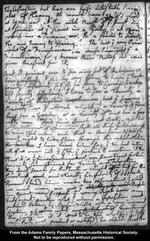
Ecclesiastic, but they are base detestable Principles of slavery. He would have 99/100 of the World as ignorant as the wild Beasts of the forest, and as servile as the slaves in a Galley, or as oxen yoked in a Team. He a friend to Liberty? He an Enemy to slavery? He has the very Principles of a Frenchman-worse Principles than a Frenchman, for they know their Belief and can give Reasons for it.)
Prat. It grieves me to see any sect of Religion extinguished. I should be very sorry, to have the Quaker Society dissolved, so I should be sorry to [have] Condy's Anabaptist Society dissolved. I love to see a Variety. A Variety of Religions [illegible] has the same Beauty in the Moral World, that a Variety of flowers has in a Garden, or a Variety of Trees in a forrest.
This fine speech was Prats. Yet he is sometimes of opinion that all these Sectaries ought to turn Churchmen, and that a Uniform Establishment ought to take place through the whole Nation.
[illegible] I have heard him say, that We had better all of us come into the Church, than pretend to overturn it &c. Thus it is, that fine Speechmakers are sometimes for Uniformity, sometimes for Variety, and Toleration. They dont speak for the Truth or Weight but for the Smartness,
and and Novelty, singularity of their speech. However I heard him make two Observations, that pleased me much more. One was that
[illegible] People in Years never suppose that young People have any judgment. Another Was, (when a Deposition was produced taken by Parson Wells, with a very incorrect Caption, a Caption without
any certificate of mention of the Cause in which it was to be used, or certifying that the Adverse Party was present or notifyed) he observed that the
Page 45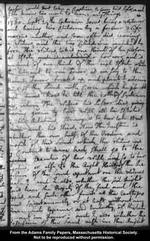
Parson could not take a Caption, to save his Life, and that he knew too much to learn any Thing.
1760.SEPTR. 24TH.
Ephraim Jones, being a Widower and having two Children by a former Wife marries another, and soon after dies, leaving a Widow, and the two Children, mentioned before. The Widow takes one third of the personal Estate, and is endowed of for ever, and is endowed of one third of the real Estate, which she lets out to one Tower, as we say to the Halves. Tower breaks up, and plants 1/2 a dozen Acres of the Land with Corn, which he ploughs and hoes &c. till the 20th of September, when The Widow his Lessor dies, giving having given by her Will, all her Estate to her Relations, Strangers to her late Husband and his Heirs. Now The Question is whether, the one half of the Produce and profits of this Land which the Widow was by Contract to have had, shall go to the Legatees Executor of her Will, and so to her Legatees, or else to the Right Heirs, of the Reversion of the Land, expectant on the Widows Death? And Q. also, whether, the said Right Heirs have the Property of the feed and the Apples, and such other fruits as the Earth produces spontaneously, or at least without any immediate Expence and Industry, of the late Tenant in Dower: and Q. also whether the Possession of the Land vests in the Right
Page 46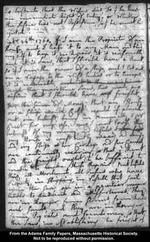
[heir] Eo Instante that the Widow dies, so that he has an immediate Right of Entry, or Whether the Lessee has not Possession, so that he must be ejected?
SEPTR. 24TH. 1760.
If I am the Proprietor of an House, and I lease it to any Man, and bind my self to keep it in Repair, it is reasonable and it is Law, that I should have a Rent. So if I am the owner of a ship, and I let [it] out on a Voyage to the Wist Indies or to Europe it is reasonable, and it is the maritime and the maritime Law has made provision that I should have [illegible] freight. For the sum of Money, that an House or a Ship would Cost, would if placed out, on Interest, bring in Annually 6 pr. Cent for my Use. Now I cant loose the Interest of my money, and besides [illegible] my House is constantly wearing and decaying and my ship and her Cordage and her Canvas are continually wearing, so that the Rent and the freight ought to be sufficient to enable [me] to make these Repairs: But besides this, all Merchants, all Persons who have Property, in shipping, in Vessells that sail upon the sea, are in a peculiar manner liable to Accidents and Misfortunes. They are in Danger, from storms, from Rocks and sands, and they are in Danger from Pyrates and frenchmen, so that the Law, in establishing the freight of
Page 47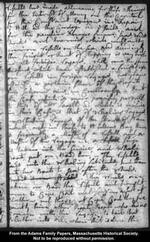
Vessells has made allowance, for these 3 things-for the Interest of Money on the Capital, for the Constant
Expences in Repairing the Hull and the Cordage and the sails, and for the peculiar Danger from seas, Winds, Rocks and Enemies, which constantly environ
Vessells on the sea. And accordingly the freight or Rent of shipping is very high in all foreign Voyages. Well, now the same Reasons, which have established a freight upon
Vessells in foreign Voyages, has by Law established a certain share of the Profits
[of] this schooner now in Controversy. But the Case, which is more precisely parrallel to this of Mr. Lovell, and which is decisive in this Case, is that of Whaling Voyages. In Whaling Voyages, of
[off] the shoals of Nantuckett, and in those to Hudsons Bay, there is frequently, a Master of a
Vessell, and a Master of the Voyage i.e. a
Vessell ship is taken into the service, and Whale Boats put on Board her. The
Vessell sails into the Whaling Latitudes, and then puts her Boats to sea after the Whales.
[illegible] The Whales are taken on Board the
Vessell, and brought home to Cape Cod we'l say, in a sort of Blubber. Wel there, at Cape Cod they frequently hire other People, People who had no Concern with the Voyage, to boil that Blubber into oil. When that is done the
Page 48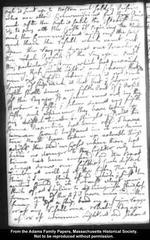
oyl is sent up to Boston and sold by Persons who are allowed Commissions for their Pains and after the
Oyl is sold, the Established Rule is, to pay all the Costs of Boiling the Blubber and the Commissions arising on the sales and then the
Vessell which went out upon the Voyage draws one Quarter of the whole Profits of the Voyage. But the particular Custom which has prevailed among these small Lighters, and schooners that run out a fishing, where there is not so much Danger of Shipwreck, is that the schooner or Lighter shall draw one fifth Part of the Profits of the Voyage. If a schooner runs out in the
Harbour a fishing the schooner draws every fifth fish, and whenever they have taken up any drifted Timber or Shingles or Boards, the same proportion has been observed. I have known several Instances in which our Braintree Boats have taken up valuable things adrift, in Cases where there has been no danger to the Lighter, only her time has been consumed, and the Boat always drew one fifth of such drifted Timber as well as of the fish. The only thing, that I can think of, and which the first
[illegible] to its utmost extent
[illegible] think of, as I believe to distinguish this Case from any of the 3 that I have mentioned, either from that of a ship on a foreign Voyage or of any
Vessell on a Whaling Voyage or of common Lighters and schooners
Page 49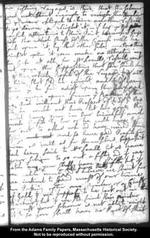
on fishing Voyages, is this. That the schooner was not stout enough to weigh the Anchor and they were obliged to hire another
Vessell to go down a Weight
[ i.e. and weigh] it. -- I beg your Hs
[Honor's] careful Attention to this Point, because I suppose the whole stress of the Cause will be laid upon it, by the other side. -- Now this I insist upon it can make no Alteration in the Case at all. For Mr. Lovells
Vessell went out, upon the supposition that she should draw 1/5 of the whole Profits of the Voyage, 1/5 of all the fish, that should be caught, and 1/5 of every Thing that he found adrift upon the surface or drawn upon from the Bottom of the Sea. And without this Prospect of 1/5 of the Profits, he would not have let her gone. He could have gone in her himself and made Profits by her or he could have let her out to others who would have minded their fishing,
and not and so have gained Profits for him as well as for themselves. Suppose it had been said to Mr. Lovell, let us have your schooner to go out a fishing, and if we catch any, you shall have a fifth, but if we catch none,
you shall have nothing and I believe we shant for we intend to spend most of our time in Poking after an Anchor or a Chest of Gold, that we suppose to be lost out in the
Harbour; but if we should find this Anchor or Chest your schooner is not able to weight it, and so you shall have no Part of that.
Page 50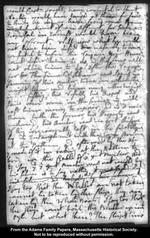
Would Captn. Lovell have consented to that. No he would have laughed at them for fools to think he would, or have frowned upon them in Resentment of an Affront, for such a Proposal in Earnest would have been an affront. Well now what he could not have been desired too reasonably to have consented to before the Voyage Your Honor cant desire him to do, and the Law will not oblige him to do after the Voyage. The Time of [the] Schooner was spent in securing of the anchor, time in which she might have earned him money either in fighting or fishing, his Vessell, his Ropes, and Sails were worn in the service, which will cost him money to repair; and what is worse than both the former, his Property was endangered, his Anchor was in great Risque of being irrecoverably lost in the first Place by its Entanglement with the large Anchor at the Bottom, and afterwards by the Use they made of it in raking at the Bottom to bring up the Cable of the great Anchor. And to say that the great Anchor was not weighed by his schooner is to say nothing. It was secured by his schooner, and totally by his schooner.
I say too that the Whales are not taken, cannot be taken by the ship. They are taken by the Whale Boats: I say too that the ship cant boil the Blubber up into oyl. But what then? The ship's time
Page 51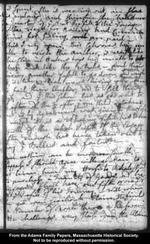
is spent, she is wearing out, and she is endangered, and therefore she shall draw a Quarter of the Neat Profits of the Voyage after Wages for Boiling and Commissions for selling,
and are paid. This I rely upon, this schooners being unable to weigh the Anchor, is exactly like the ship in Hudsons bays being unable to chase and take the Whales. And their hiring another
Vessell to go down, and weigh it, is like Whale mens hiring other Men to boil their blubber, and to sell their
Oyl, and that this schooner has as good a Right to 1/5 of the 2/3 after the one third is taken out, which by Agreement was given to the
Vessell that weighed it, as a Whaling
Vessell has to one fourth of the whole Profits of the Voyage after enough has been taken out to pay the Boilers and factors.
And nothing can be more reasonable. Suppose I should Agree with a Man, to let him have my Horse to Rhode Island to purchase a Quantity of Goods, and he engages I shall have one fifth or one Qr. of the Profits of his journey. Well when he gets upon Seachonk Plain, He finds a Number of People there a horse racing. He challenges every Horse upon the Plain
Page 52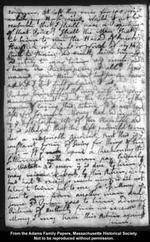
to run. At last they run for 100 Guineas which my Horse wins. Would it not be reasonable that I should have a Proportion of that Prize? Shall the Man that I let him to, run the Hazard of breaking the Neck, or Limbs or Wind of my Horse. Shall he strain, and violently drive him so as uterly to mar him very much; and I have no Recompence at all? By no means. Your Honor cant but see, we have a Right, and I dont doubt youl give it us.
Perhaps some Difficulty may arise in your Honours mind about the Propriety of the manner of laying this Action. It is an Ind [Indebitatus] Ass [Assumpsit] for so much Money had and received by the Defendant, to the Use of the Plaintiffs, and it is alledged that the Defendant promised to render a reasonable Account. But this is the constant form of Suing for things of this sort. If I reck upon a Reckoning and settlement with a man pay him by a Mistake 20 more than is due to him, I may recover it back, by this Action, i.e. he has had and received so much money, which did not belong to him but to me, so if Money is due to me from another man, and some 3d Person goes to him, and under Pretence of Authority from me, receives that Money, I may have this Action against him.
Page 53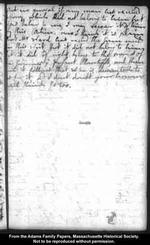
And in general if any man has received Money, which did not belong to him, but does belong to me, I may recover it of him by this Action. Now I think it is plain that Mr. Ward has received the sum mentioned in this Writ, that it did not belong to him but it did of right belong to the owners of the schooner the present Plaintiffs, and therefore it follows that he is accountable to us for it, and I dont doubt your
honour will think so too.
Page 54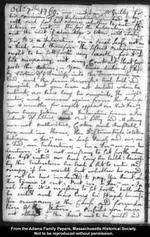
OCTR. 7TH. 1760.
Waited on Mr. Gridley for his Opinion of my Declaration Lambard v. Tirrell, and for his Advice, whether to enter the Action or not. He says the Declaration is bad and the Writ, if Advantage is taken, will abate.
For It is a Declaration on a Parol Lease, not on a Deed, and therefore the Lessee's Occupancy ought to be
sett forth very exactly, for it is his Occupancy, not any Contract, that supports the Action. -- You have declared, that Defendant by Virtue of the Demise, into the Tenements, entered, and the same Premises had, held and occupied. But you have not declared when he entered, nor how long he occupied. He might enter, and remove again from the Premises in 3 months, for ought appears on this Declaration. You have taken this Declaration from a Precedent of Lillies.
[illegible] But Lilly and Mallorry are not Authorities, Coke and Rastall are, and in them, the Distinction is taken between a Declaration on a Lease Parol, and one on a Deed, an Indenture. In a Declaration on an Indenture, it is not necessary to set forth when the Defendant entered nor how long he held: because by the Indenture he had a Right to enter and occupy, if he would, but whether he occupied, or not, he has indented to pay the Rent, when the time is out: But in a Declaration, on a Parol Lease, it is necessary to set forth, both when he entered and how long he stayed, because the Occupancy is the Cause and foundation of the Action. Besides you have not
alledged that the Rent was to be yeilded and
Page 55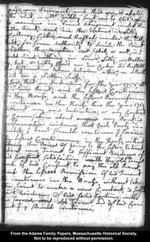
payd upon Demand, and this would abate the Writ. -- Mr. Gridley sent me to Otis's office to examine in Viners Abrigment, under the Title Rent, and in the Entries, i.e. Lilly, Mallorry, Coke, and Rastal, under the Title Debt, for some Authority to decide the Point whether the Exception was fatal, or not. I could find nothing in Viner, Lilly, or Mallorry, but Mr. Gridley
shewed me in Coke and Rastall the Distinction taken between a Declaration on a Parol and on a Written Lease.
G. says, that an Indenture for the Year 1758, att a certain Rent; and the Lessees Continuance in the House, and the Lessors Permission to continue in the House, thro the Year 1759 without any new Indenture, or any Contract or Conversation about [illegible] any Rent, is presumptive Evidence, that Each Party intended, the Rent should continue the same. The Lessees Continuance, in the House, without taking the Pains of going to the Lessor, to treat about new Terms, is sufficient Evidence of his Consent Satisfaction with the old Terms and of his Consent to pay the old Rent. And the Lessors Permission of his Tenant to continue in the House, without taking the Pains to make a new Contract, is sufficient Evidence of his satisfaction with the Terms, and old Terms, and of his Consent that they should continue.
Page 56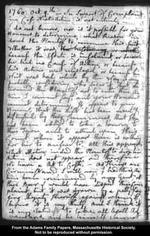
1760. OCT. 9TH.
In Support of Complaint in Case Neal's Action is not entered.
I do not know, nor is it possible for your
Honours to determine, what Reason induced the
Plantiff to renounce this suit. Whether it was,
the insolvency or whether because the Estate is insolvent, or because he had no Cause of Action, or because his Action was mislayed, or because his Writ was bad, which by the Way is very probable, considering who drew it, that determined the
Plantiff, not to enter this Action, I cannot say, and your
Honours cannot determine. It appears to your
Honours, that the Defendant has been vexed and distressed by this summons, that she has been obliged to take a journey to this Town, and to attend upon this Court, where it appears there is nothing for her to answer to. All this appears. What Motive induced the
Plantiff to drop his Action does not appear, and therefore We have a Right to Costs. As Things are Circumstanced, I will own, that had this Action been commenced by any Gentleman, at this Bar, I would have dispensed
[with] this Complaint, but it was drawn by a petty fogging Deputy Sheriff against whom I know it is my Duty, and I think it is my Interest to take all legall Advantages. And he himself cannot
Page 57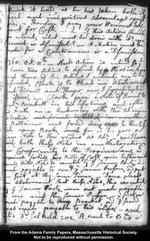
think it hard, as he has taken both illegal and iniquitous Advantages against me. Therefore I pray your
Honours Judgment for Costs. -- Q. If this Action should be entered, what must be done with it? Continued, or dismissed?-A Motion must be made for a Continuance or a Dismission.
1760. OCT. 11TH.
Neals Action is entered so that I have two Actions to defend by Pleas in Bar and three of the Actions I entered, are to be defended, Clark is to Plead in Abatement and Tirrell and Thayer are, I suppose, to plead to issue. Clark gave a Note of Hand to
Captn. Brackett in his Life time, and after his Death, on a Reckoning with the Administratrix,
[illegible] a
Ballance was found due to the Estate upon Book,
and for which he gave a new Note to the Widow as Administratrix. Now I have laid both these Notes in one Declaration in Conformity to the Province Law, which
requires forbids two Bills of Cost, upon Instruments, Bonds, Bills, Notes &c. executed by the same Party, and made payable to one and the same Person, and put in suit at the same Time. Dana pleads in Abatement, that these Notes,
tho executed by the same Party, were not made payable to one and the same Person. The first was made payable to Bracket, and the second was made payable to his Wife-and cites 3rd. Salkeld 202. "A. owed to B. .20 as
Page 58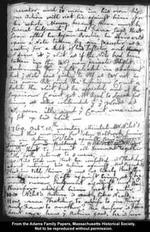
Executor, and 10 more in his own Right. One Action will not lie against him for the whole Money, because there must be several judgments." And Dana says, that soon after he began Practice, he drew a Writ upon a Note taken by an Executor, as Executor, for a Debt of his Testator, and drew the Writ as if the Note had been taken in the Executors own private Right.
Auchmuty for the Defendant, pleaded in Abatement that the Note was given to Plaintiff as Executor, not in his own Right, and the
Inferiour Court abated the Writ, but he appealed, and at the
Superiour Court, got Mr. Reed to speak for him, who contended that the Words as Executor, were idle, and the Court unanimously set up his Writ.
1760. OCTR. 13TH. MONDAY.
Attended Mr. Niles's Court this morning for John Holbrook junior in an Action of his against Benja. Thayer Junior for Holbrook. Holbrook agreed with Thayer, that to submit all Demands together with both Actions to 3 men.
Mr. Niles told me, that he consulted Mr. Thatcher about entering his Action against Mrs. Brackett. Thatcher told him, it was as likely that she would recover Costs against him, as that he would recover judgment against her, And therefore advised him not to enter. Niles's Action is exactly like Neals. How came Thatcher to advise to one Thing and Dana to another? The Answer is Dana dont care, how the Action goes. He is sure
Page 59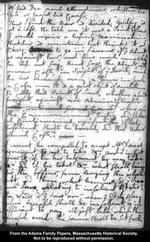
of his Fee and attendance, whether he gets or looses his Cause.
Thus I find the Bar is divided. Gridley is at a loss. He told me it was a Point of Law that would require a leisurely Examination. Thatcher is uncertain, but thinks it as likely [illegible] to go in favour of the Administratrix as against her, and how much more likely he did not say. Kent says, the Administratrix will recover Costs, in Spight of the Devil, and he has recovered many a Time in such a Case. -- It is a great object of Ambition to settle this Point of Law, whether a suit brought against an Administrator [illegible] , who after the Commencement, Entry and several Continuances, represents the Estate Insolvent, shall be barred, and the Administrator allowed Costs?
I cannot be compelled to accept Mr. Dana's agreement not to take Execution. And I insist upon it, if he has judgment, he may take Execution, and if he takes Execution, what shall hinder the officer, from levying the whole Debt, and then what becomes of the Province Law, relating to insolvent Estates? The Words of the Law are "when the Estate of any Person deceased shall be insolvent, or insufficient to pay all just Debts, which the deceased owed, the same shall be set forth
Page 60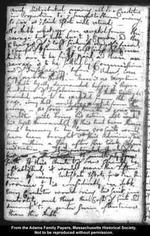
and distributed, among all the Creditors in Proportion to the sums to them owing, so far as the said Estate will extend."
No Debts whatever are excepted from the Average, but Debts due to the Crown and the Charges of the last sickness and of the funeral. The Charges of the funeral, of the last sickness and Crown Debts are to be first paid, and then an Average is to be settled by Commissioners of Insolvency, before the Administrators can pay another Debt. There is no Exception of Debts legally demanded before the Representation of Insolvency. If Debts legally demanded, were to be excepted from the Average, every Debt would be excepted from the average. As soon as the Intestates Breath is gone, every Creditor will bring his Action, will make his legal Demand. If this had been Law and known to be law, 500 suits would have been brought vs. this Administratrix, within a Day after she took Administration. [illegible] If this Rule of Law should be established, it would prove the Destruction of every Intestate Estate in the Province that is considerably in debt. Every Creditor would bring his suit, immediately, and thus the Costs of Suits would amount to a greater sum, oftentimes than the Debts.
Page 61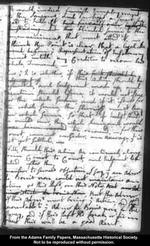
It would indeed, furnish Employment to the Lawyers, and perhaps, a secret Regard to Interest [illegible] has blinded some to the Inconveniences, that must attend it. I think the Point is clear, that a legal Demand, before the Representation of Insolvency cannot intitle any Creditor to recover his whole Demand.
Now the Q. [Question] is whether, if this suit should be [Judgment?] this Action should be defaulted, and Judgment made up, and Execution should issue, it would not issue for the whole sum; and if it issues for the whole sum, the sheriff must levy the whole sum. So that, if judgment should be rendered now, the whole Demand would [illegible] be recovered. For this Court cannot consider an Average, that is not yet settled.
Well, should this Action be continued, along from Court to Court, and judgment be entered after the.
In answer to Sewals objection, I say, that an Administrator de Bonis non, could not maintain an Action vs. this Defendant, on this Note. [illegible] But the Administration of this Administratrix must bring the Action, and stand accountable to the Administrator de Bonis non, for the Money, and if this Defendant should break, or die insolvent this would be a good Account.
Page 62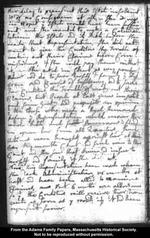
Her delay to represent this Estate insolvent is of no Consequence at all. She was in Hopes, the Estate would have been sufficient, and she wanted to make a Calculation between the Estate and its Debts, before she made that Representation. She did not want to give the Creditors the Trouble of making out their Claims before Commissioners, if she could pay them without it. She acted in short as every prudent Administrator would do, to save herself and family the Disgrace and Curses of Insolvency, and to save her Creditors, the Trouble of making out their Claims, but People at last grew impatient and some Gentlemen had propagated an Opinion that those who made a legal Demand before the Representation, would recover their whole Debts, and [illegible] summons's flowed in upon her from all Quarters. Several Actions were brought against her, at this Plymouth Court, and several more to this Court, and she saw that Ruin would insue to herself and family if she did not.
Now had this Representation been made when she took Administration, 18 months at least would have been allowed to examine Claims. But 6 months were allowed [over?] so that the Creditors will receive their share quite as soon as they would, if it had been represented sooner.
Page 63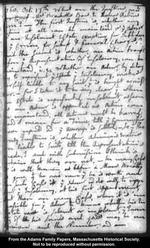
1760. OCTR. 17TH.
What are the Questions, on which [illegible] Mrs. Bracketts Bars to Danas Actions turn? - The first Question is, whether any Action at all can be maintained vs. the Administrator of an Insolvent Estate excepting for Debt due to the Crown, for sickness and funeral Charges? And the second is, whether an Action brought before the Representation of Estate of Insolvency, can be maintained, i.e. Whether an Administrator, by delaying to represent the Insolvency, makes herself liable to any suit, that is brought against her. For I take it to be very clear, that when an Estate is represented insolvent, as soon as an Administrator is appointed no Action can be maintained. All Actions must be barred, bar'd I mean for a Time, till the Commissioners have reported and the Average is settled. So that the only Question is, whether Administrators are liable to suits, till the Representation is made? And with submission I think [it] is certain that they are not. In many Cases it is well known, before a Mans Breath is gone, that he owes more than he is worth, and in such Cases the Administrator would do well to represent the Insolvency, at his first Appointment, but there are many Cases, when it is impossible for the Administrator to know whether his Intestate was is solvent or insolvent, the Quantity of the his Lands and goods may be unknown, and the Number and
Page 64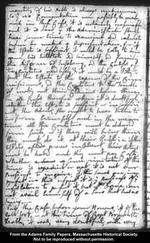
Quantity of his Debts is always unknown so that no Computation can possibly be made, and in these Cases, it is certainly reasonable and it is Law, that the Administrator should have some time to examine and calculate before he makes a Representation, for if the Estate is sufficient, it would be folly to draw upon his Intestate and himself and family the Disgrace of Insolvency, and the Curses of the Creditors needlessly, and it would be a
Pitty to put the Estate to the
Expence of the Commissioners, and the Creditors to the Trouble of making out their Claims before them. In all Cases therefore where it is doubtful whether the Estate is sufficient or insufficient, the Administrator ought to have time to inform himself, and in the mean time, all the Creditors must be debared from suits, or if they will bring them they must do it at their Peril, i.e. if the Estate afterwards proves insolvent, their Actions must be bared and they must pay Costs. Whether
a Law some Limitation of the time, is expedient or not, it is not our Business to inquire, if the Laws are imperfect in this respect it is the Business of the Legislature to perfect it, but Mr. Dana cannot avail him self of a Law that has no being.
Now the Case before your Honour, is of the last sort. At the Time of Capt. Bracketts Death, it was very doubtful, with every
Page 65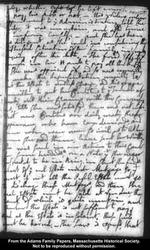
body, whether
left he left enough to pay his Debts or not. His Widow, on her appointment, to the Administration, told the judge, it was uncertain, and asked time to inform herself; and she has been as diligent as she could, considering the distressed situation of her family, in making
Enquiry after the Debts. She found Effects enough in her Hands to pay all the Debts that she was apprized of, and so was unwilling to make the Representation, unwilling to put the Estate to needless Charge, and Disgrace, unwilling to put her Creditors to the Trouble of making out their Claims with the Commissioners, till she was satisfyd, there was not enough. But new Creditors are daily making their Appearance, who have large demands, and some who were never so civil as to let her know she owed them, have sent her
Writts. She was sued in one Action to this Court for some hundreds, on a Note that she never suspected to be in Being. In short she finds most of the real Estate under Mortgage, so that most, if not all the Personal Estate must go to discharge these Mortgages, and then the real Estate must be sold at Vendue, the Event of which is quite uncertain, and therefore the Estate is not sufficient to pay. And as the Estate is insolvent, these suits must be barred. The Law is express, that
Page 66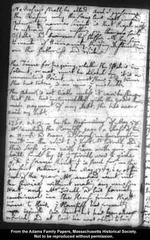
No
Proscess shall be allowed. And I presume the Reason, why the Law has not confined Administrators to narrow limits, is that People
[must?] be restrained from rushing on
[illegible] such Estates, and
[illegible] by stifling all the sentiments of Humanity, bringing Destruction on the fatherless and Widows.
The Time for Enquiry, whether the Estate is insolvent, or not, must be dilated on. It is a momentous Point. Must shew, that the time she has taken, is no more than reasonable.
The Administrator is not liable unless it can be shewn that she has intermeddled with the Goods and made payment of any Debt. She has never paid any Debt.
1760 OCT. 17.
In the Beginning of May 58 Mr. Lambard, the Plantiff, gave a Lease of a House and Barn and Land in Germantown mentioned in the Writ to the Defendant Mr. Tirrell, and this Lease you will have with you. You will find by it, that Tirrill was to give [illegible] &c. the same Rent, that is sued for, in the present Action. In May 1759, i.e. at the End of the Year, Mr. Lambard went into the service, without making any new Contract, and Mr. Tirrell and his family continued in the House from that time to this. The Plantiff has frequently reque requested his Rent, but has been always refused, and at last he was obliged to bring
Page 67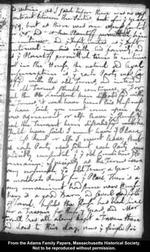
his Action. As I said before there was no express Contract between the Parties,
but for the Year 1759, but as there was an express Contract for 58, and
as the Plantiff permitted him to continue, and as the Defendant continued as the Defendant continued with
[illegible] his family, and as the
Plantiff permitted him to continue in the House, the natural and legal Presumption is, that each Party was satisfyd with the old Terms, and intended the old Terms should continue. For had the Landlord been dissatisfyd with the Terms, it would have been his Business to have said, you must come upon a new Agreement or else leave the House, and had the Tenant been
dissatisfyd he should have said I must have the Place for less Rent or else I must leave. But as each Party was silent, each Party implicitly consented that the old Conditions should remain; especially as the Terms were very reasonable. 70 old Tenor, a Year is a moderate Rent for that Place. There is a very convenient handsome new House, there is a good Barn, and several good Lotts of Land. Besides the House has had Licence for a . Tavern for these 7 Years, and Mr. Tirrell has all along kept a Tavern there and does to this day. Now the single
Pri [Privilege]
Page 68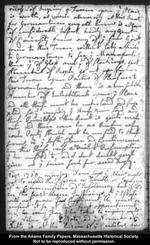
viledge of keeping a Tavern upon that Place is worth as much annually as this Rent. For Germantown, you all know is a Place of considerable Resort. Hardly any Gentlemen of Curiosity from any of the four Governments come to this Town, without taking a Ride to Germantown to see the Manufactures there, that of Glass and that of Stockings. Great Numbers of People go out
[illegible] from this Town upon Parties of Pleasure to Germantown, and there is a considerable Number of Inhabitants upon the Place and all these must be entertained and supplied, so that considering the House, Barn, Land, and these
Priviledges the Rent is quite moderate, and there can be no Reason why each Party should not be confined, to those Terms, which the Defendants silence and Continuance in the House, raise a violent Presumption that he consented to, and I dont doubt-
you'l give us the sum sued for accordingly.
[3] NOVR. 1760. MONDAY.
Dana says the Administrator ought not to regard the Disgrace or Trouble or Expence of a Commission of Insolvency, but if it is in the least degree suspicious, that the Estate will not prove sufficient, he must represent it so, at his first Appointment i.e. every Day, that he takes to enquire into the Value of the Estate, and the Number of Debts, is at the Risque of the Creditors, and
Page 69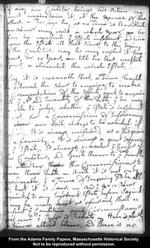
if any one Creditor brings his Action he must maintain it, at the
Expence of the others. For says he, as no Time is limitted an Administrator may wait a whole Year, before he represents the Estate insolvent, and live upon the Estate all that time, to the Injury of the Creditors. Nay he may neglect it two Years, or 10 Years, till he has wasted, spent, or alienated the whole Estate.
I say, it is reasonable that a Time should be allowed the Administrator to enquire, to make a Computation of the Effects, and to enquire into the No. and Quantity of the Debts, that he may be able to judge, whether the Estate is insolvent or not. For a Commission of Insolvency is an Evil, always to be avoided, if Possible. It is always considered as a Disgrace to a family. It is always a great Expence to the Estate. It always provokes the Curses of the Creditors, and puts them to the Trouble in attending the Commissioners to prove their Debts. And it is not only reasonable, that a Time of Enquiry should be allowed, but it is Law. And the Executor or Administrator appointed to any Insolvent Estate, before Payment to any be made, except as aforesaid, shall represent the Condition and Circumstances thereof unto the judge of Probate. Here is plainly a time allowed him, and there is no
Page 70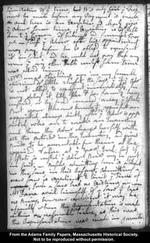
Limitation of that time
, but. It is only said the Representation must be made before any Payment is made. And here is an Exception, which clearly gives the Administrator, some time; the Exception is of Debts due to the Crown, of sickness and funeral Charges. These the Administrator, after his Appointment may pay, before he is obliged to represent it insolvent, and he could not pay these any more than any other Debts unless some time was allowed him.
Mr. Danas Objections are in my humble opinion of little Weight. He says, that if the Administrator is not obliged to represent immediately, he may delay it, till she and her family have consumed, or by fraud conveyed away the Estate. But your Honours know that Apprisers are appointed, always directly after the Administrator is appointed, who are to make an Inventory and then the Administrator charges herself with all the Articles in the Inventory, and gives Bonds to be accountable for them at the apprized Value, at the Years End. So that if the Estate is wasted the Administrators Bond may be put in suit. Besides, admitting here is a Defect in the Law, in this Respect, Admitting a new Law is expedient, to limit the Time of representation, such a Law has no Existence, nor can Mr. Dana avail himself of a Law that has no Being, however expedient it may be, especially when the Representation is made within a reasonable Time, as this was. The Representation was made in 9 months,
Page 71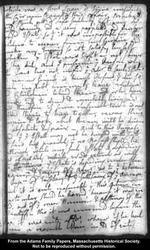
which was a short space of Time considering the Circumstances of this affair. Brackett was struck out of Life suddenly, left a very distressed family, and a very perplexed and embarrassed Estate, so that it was impossible for the Widow to recover from her
surprize, and make any Inquiry so as to satisfy herself whether the Estate was sufficient or not, sooner than she did. And I presume the Reason why the Law has not confined the Administrator to such Estates to narrow limits, is, because Persons, that die so much in Debt, commonly leave Widows and Children behind them, who have been used to decent and reputable living, and will therefore, if some reasonable time is not allowed them to keep together, recover their
surprize and look about them, will be driven to absolute Despair. And to this Purpose and that the Estate may not be burdened with Costs, the Law has provided, that no
Proscess shall be allowed, while any such Estate is depending as aforesaid, which Words extend as well to the Time, the Estate is depending under the Examination and
Enquiry of the Administrator as to that between the Representation of Insolvency and the settling of the Average. And it is quite reasonable that this Action in Particular, should be barred, because it was entered, out of the meer
Humour and Obstinacy of the
Plantiff.
Tho it was commenced before the Representation it was entered afterwards, whereas if he had been a reasonable Man, instead of entering
Page 72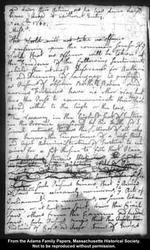
and driving this Action, as he has done, he should have dropd it without Entry.
NOV. 5TH. 1760.
Messrs.
The World will not take no offence I presume upon the common sense of the World that no offence will be taken at the Freedom of the following Sentiments while the utmost Deference for Authority and Decency of Language is preserved, as Persons of obscure Birth, and Station, and narrow Fortunes have no other Way, but thro the Press to communicate their Tho'ts abroad, either to the high or the low.
The Vacancy, in the highest seat of justice in the Province occasioned by the Death of J. [Judge] Sewal, naturally stirrs [illegible] the Minds of all, who know the Importance of a wise, steady and loyal Administration of justice, to enquire for a fit Person to fill that Place. [illegible] Such Persons know, that the Rules of the common Law are extreamly numerous, that Acts of Parliament are numerous, some taken from, or at least in spirit, from the Civil Law, others from the Cannon and feudal Law. Such Persons know that the [illegible] Histories of Cases and Resolutions of Judges
Page 73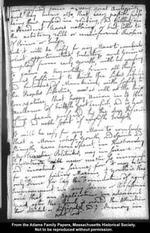
have
[been] preserved from a very great Antiquity, and they know also, that every possible Case being thus preserved in Writing, and settled in a Precedent, leaves nothing, or but little to the arbitrary Will or uninformed Reason of Prince or judge.
And it will be easy, for any Man to conclude what opportunities, Industry, and Genius employd from early Youth, will be necessary to gain a Knowledge, from all these sources, sufficient to decide the Lives, Liberties and fortunes of Mankind, with safety to the Peoples Liberties, and as well as the Kings Prerogative, that happy Union, in which the Excellence of british Government consists, and which has often been preserved by the deep Discernment and noble spirit of english judges.
It will be easy for any Man to conclude that a Man whose Youth and Spirits and Strength, have been spent, in Husbandry Merchandize, Politicks, nay in science or Literature will never master so immense and involved a science: for it may be taken for a never failing Maxim, that Youth is the only Time for laying the Foundation of a great Improvement in any science or Profession and that an Application in advanced Years, after the Mind is crowded, the Attention divided, or dissipated, and the Memory in part lost
Page 74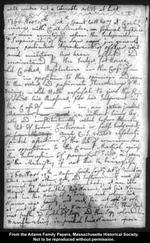
will make but a tolerable Artist at best.
[See also: John Adams,
[Diary 4]
for entries dated November 14, 1760]
1760. NOVR. 15TH. SAT.
Spent last Evening at Coll. Quincys, with Coll. Lincoln. Several Instances were mentioned, when the Independency and Superiority of the Law in general over particular Departments of officers, civil and military, has been asserted and maintained, by the judges, at Home. Ld. Cokes Resolution in the Case of in oposition to the opinion, and even to the orders, and passionate Threatnings of the King. Ld. Holts refusal to give the House of Lords his Reasons, for his judgment in the Case of in an extra judicial Manner, [illegible] i.e. without being legally and constitutionally called before them by a Rit [Writ ] of Error, Certiorari, or false judgment or something. And C. [Chief] J. [Justice] Wills's resolute spirited assertion of the Rits [Rights] of common Law in opposition to the Court Martial against the Intercession of powerful Friends, and even of the Ministry if not the K [King ] himself.
1760. NOVR. 19TH.
Parson Smith says the Art of Printing like most other Arts, and Instruments, was discovered by Accident. Somebody, at an idle Hour, had whitled his Name, cut his Name out in the Bark of a Tree. And when his Name was fairly cut out, he cut
off it off
[and] put it into his Hankerchief. The Bark was fresh, and full of Sap, and the Sap colored his Hankerchief, i.e. printed his Name upon it.
Page 75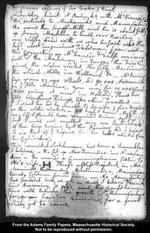
And from observing that he
tooke the Hint.
WEDNESDAY [19 NOVEMBER].
Dined at Badcocks, with McKenzie. He pretends to Mechanicks, and Manufactures. He owns the snuff Mill, and he is about setting up some Machine to hull our Barley. One Welsh dined with us, who he said was the best, most ingenious Tradesman, that ever was in this Country. McKenzie and Welsh were very full of the Machinery, in Europe, the Fire Engines, the Water Works, the silk Machines, the Wind Mills, in Holland &c. McKenzie says there are 27,000 Wheels, and 90,000 Movements in the silk Machine. You may see 10,000 Wind Mills going at once in Holland. Thus he tells Wondrous Things, like other Travellers. -- I suspect he would be unable to describe the fire Engine or the Water Works. Had I been Master of my self I should have examined him, artfully, but I could not recollect any one Particular of the fire Engine, but the Receiver, and that he says is no Part of the Engine. But he talks about a Center Cylinder.
This conceited Scotchman has been a Rambler I believe. He set up Merchandize in New London. He married a Cunningham, sister to Otis's Wife. -- These restless Projectors, in Mechanicks, Husbandry, Merchandize, Manufactures, seldom succeed here. No Manufactury has succeeded here, as yet. And I believe Franklins Reasoning is good, and the Causes he mentions will hinder the growth of Manufactures here in America, for a great While yet to come.
Page 76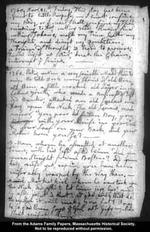
1760. NOVR. 21 ST. FRIDAY.
This day has been spent to little Purpose. I must confine my Body, or I never shall confine my Tho'ts. Running to Drs., cutting Wood, blowing fires, cutting Tobacco, waste my Time, scatter my Thoughts, and divert my Ambition. A Train of Thought, is hard to procure. Trifles light as Air, break the Chain, interrupt the series.
[NOVEMBER] 1760.
Pater was in a very sociable Mood this Evening. He told 3 or 4 merry stories of old Horn. Old Horn, a little crooked old Lawyer in my fathers Youth, who made a Business of Jest and Banter, attacked an old Squaw one Day upon the Neck. The old Squaw made answer, "You poor lit smitten Boy, you with your Knife in your Tail and your Loaf on your Back, did your Mother born you so?"
A Man, whom he assaulted at another Time, with his jests, asked him "Did you come straight from Boston?" And upon being answered yes, replied you have been miserably warped by the Way then.
A Girl A Market Girl whom he overtook upon the Neck, and asked to let him jigg her? answered by asking what is that? What good will that do? He replied it will make you fat! Pray be so good then says the Girl as to Gigg my Mare. She's miserably lean
Page 77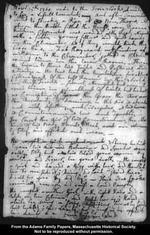
NOVR. 25TH. 1760.
Rode to the Iron Works Landing to see a Vessell launched. And after Launching went to smoke a Pipe, at Ben. Thayers, where the Rabble filled the House. Every Room, kitchen, Chamber was crowded with People. Negroes with a fiddle. Young fellows and Girls dancing in the Chamber as if they would kick the floor thro. Zab Hayward, not finding admittance to the Chamber, gathered a Circle round him in the lower Room. There He began to shew his Tricks and Postures, and Activity. He has had the Reputation, for at least fifteen Years, of the best Dancer in the World in these Towns. Several attempted, but none could equal him, in nimbleness of heels. But he has no Conception of the Grace, the Air nor the Regularity of dancing. His Air is absurd and wild, desultory, and irregular, as his Countenance is low and ignoble. In short the Air of his Countenance, the Motions of his Body, Hands, and Head, are extreamly silly, and affected and mean.
[illegible] When he first began, his Behaviour and Speeches were softly silly, but as his Blood grew warm by motion and Liquor, he grew droll. He caught a Girl and danced a Gigg with her, and then led her to one side of the Ring and said, "Stand there, I call for you by and by." This was spoke comically enough, and raised a loud laugh. He caught another Girl, with light Hair, and a Patch on her Chin, and held her by the Hand while he sung a song, describing her as he said. This tickled the Girls Vanity, for the song which he applied to her described a very fine Girl indeed.
Page 78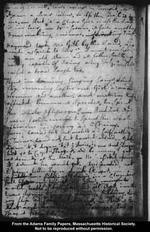
One of his witty droll sayings he thought, was this. I am a clever fellow, or else the Devil is in me. That is a Clever Girl or else the Devil is in her. Wm. Swan is such another Funmaking animal of diverting Tricks.
Hayward took one Girl by the Hand, and made a Speech to her.
"I must confess I am an old Man, and as father Smith says hardly capable of doing my Duty." This raised a broad Laugh too.
Thus, in dancing, singing songs, drinking flip, running after one Girl, and married Woman and another, and making these affected, humorous Speeches, he spent the whole Afternoon. -- And Zab and I were foolish enough to spend the whole afternoon in gazing and listening.
Gurney danced, but was modest and said nothing. E. Turner danced not, but bawled aloud. -- God dam it, and dam it, and the Devil, &c. -- And swore he'd go to Captn. Thayers, and be merry and get as drunk as the Devil. He insisted upon it, drunk he would get. And indeed, not 2 pence better than drunk he was.
Fiddling and dancing, in a Chamber full of young fellows and Girls, a wild Rable of both sexes, and all Ages, in the lower Room, singing dancing, fiddling, drinking flip and Toddy, and drams. -- This is the Riot and Revelling of Taverns And of Thayers frolicks.
Page 79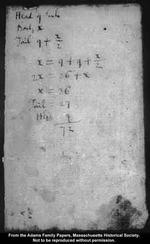
[No transcription available -- see page image]
[This page contains an algebraic formula.]
Page 80
Inside Back Cover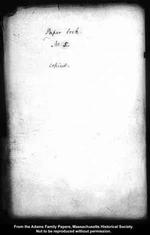
Paper Book No. 5 copied
[The preceding text was added in the handwriting of Charles Francis Adams]
Back Cover


















































































